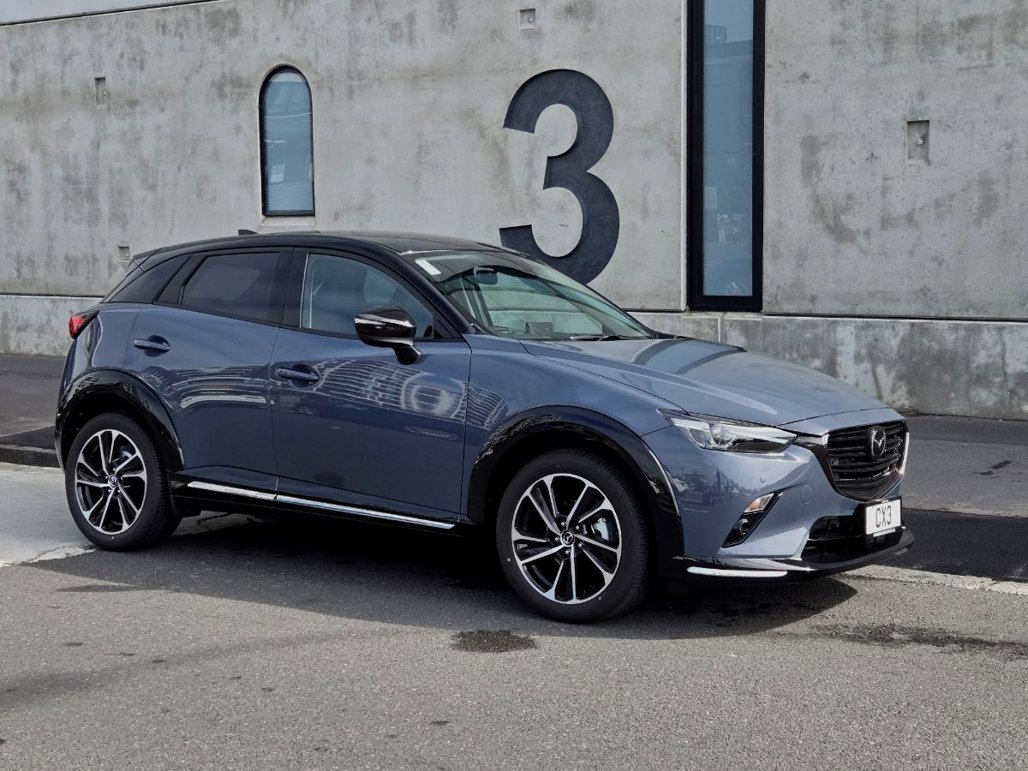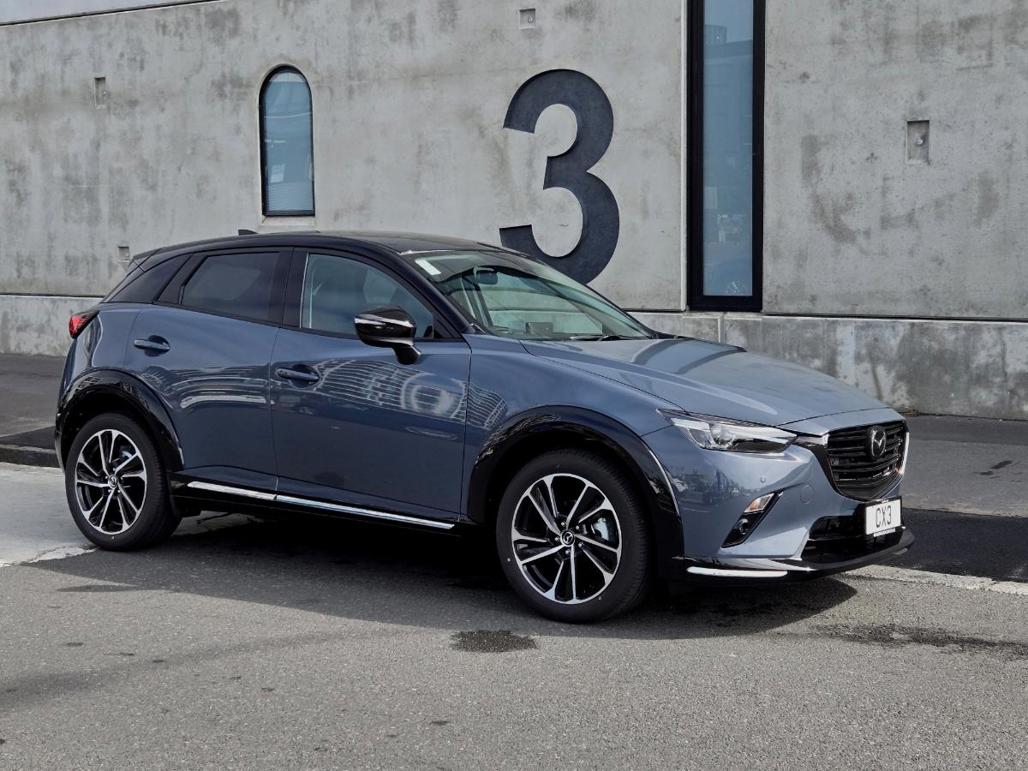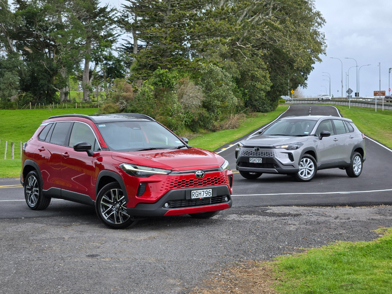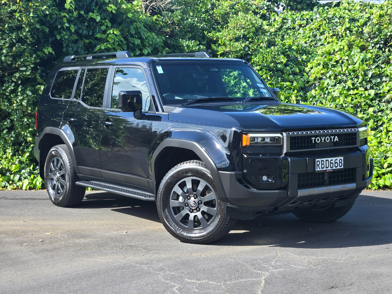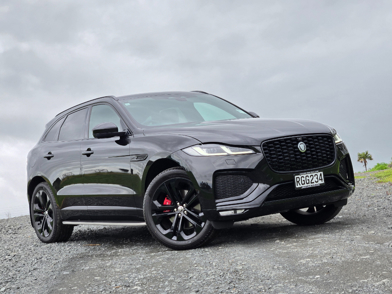Report 1 02/05/25 Report 2 22/05/25 Report 3 13/06/25 Report 4 02/07/25 Report 5 17/07/25 Report 6 06/08/25
REPORT 6: (6th AUGUST 2025)
Our time with the Mazda CX-3 SP20 has come to an end. It was never the most obvious choice for an extended review, because it’s not really a new model. Very far from it, in fact: the CX-3 has been on sale for over a decade, and while there have been many running changes along the way (including safety and infotainment technology), it’s fundamentally the same car from 2015.
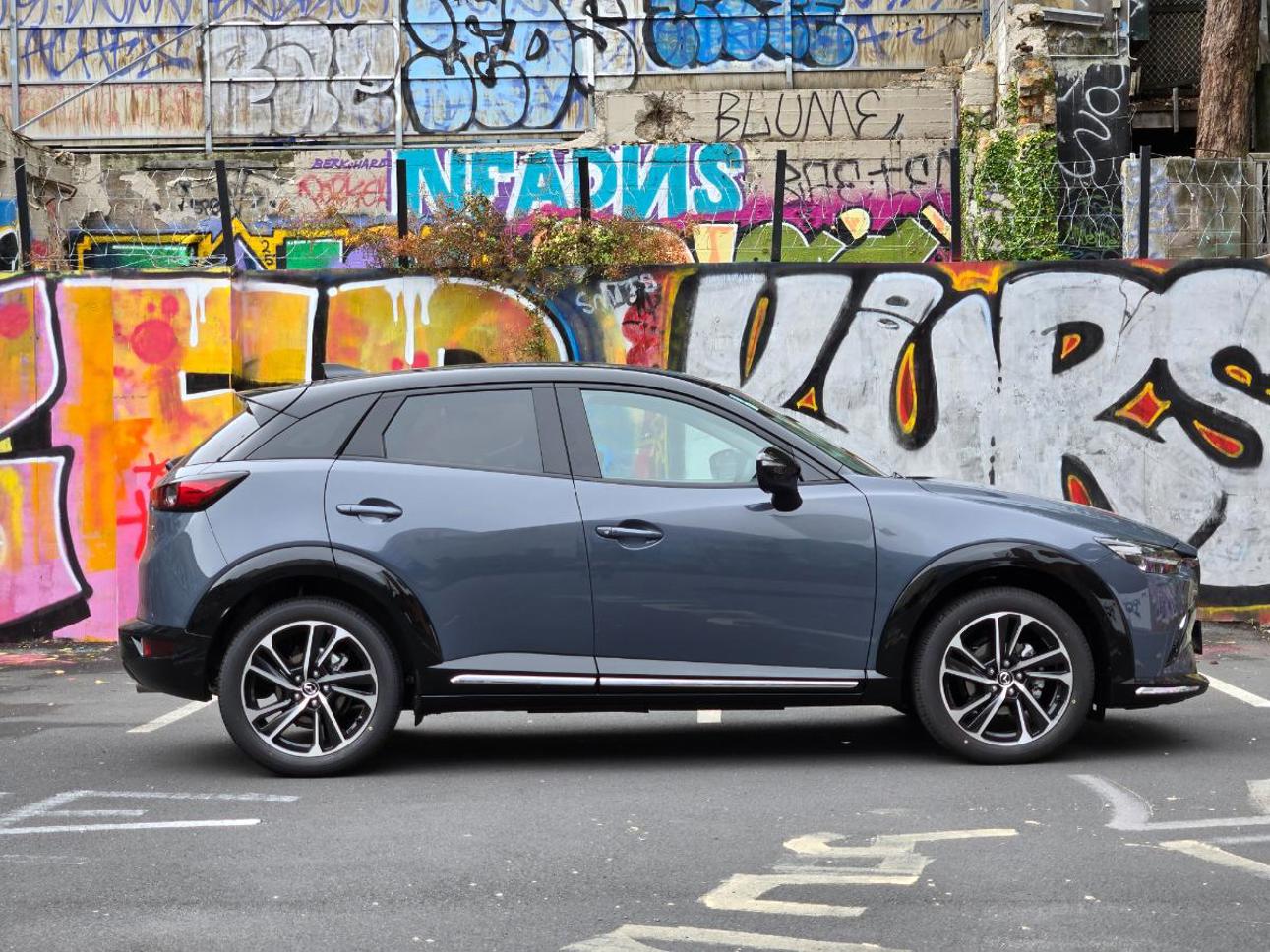
We started this year on a bit of a mission to revisit cars that weren’t new but still strong/consistent sellers, and naturally the CX-3 was in the frame: a former DRIVEN Car of the Year and a model that consistently still accounts for 10% of Mazda New Zealand sales. Not massive, but not slowing down either.
When we asked Mazda NZ the question, it argued the enduring appeal of the CX-3 might not be so obvious in the usual week-long review period. It suggested three months instead, so we could live with the CX-3 on a day-to-day basis.
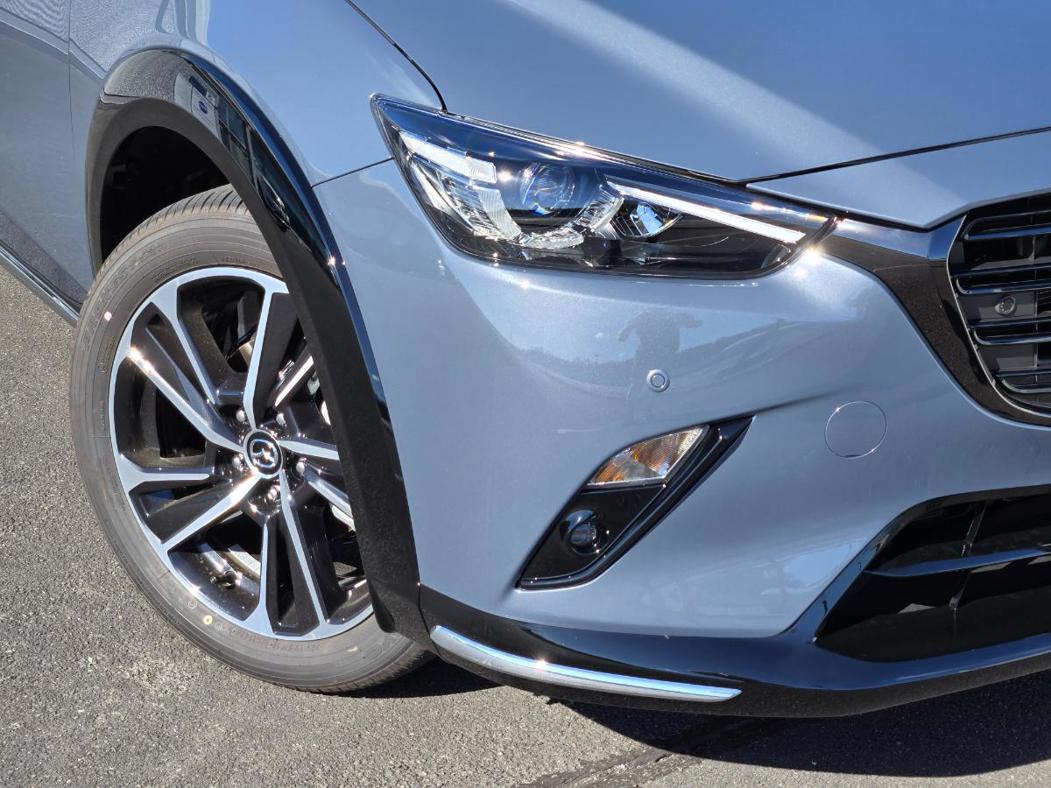
When you’re dealing with a long-running model like this, there are certain expectations. The first might be that it offers outstanding value compared to the very latest in the class, and that you’re getting much more in terms of standard equipment than you might otherwise for the money.
The CX-3 still makes a strong case on showroom appeal. Our review car was the top-specification SP20, a new model launched in 2023 to replace the Limited. You’ll know it mainly by the gloss-black wheelarches and two-tone colour scheme, with black roof.
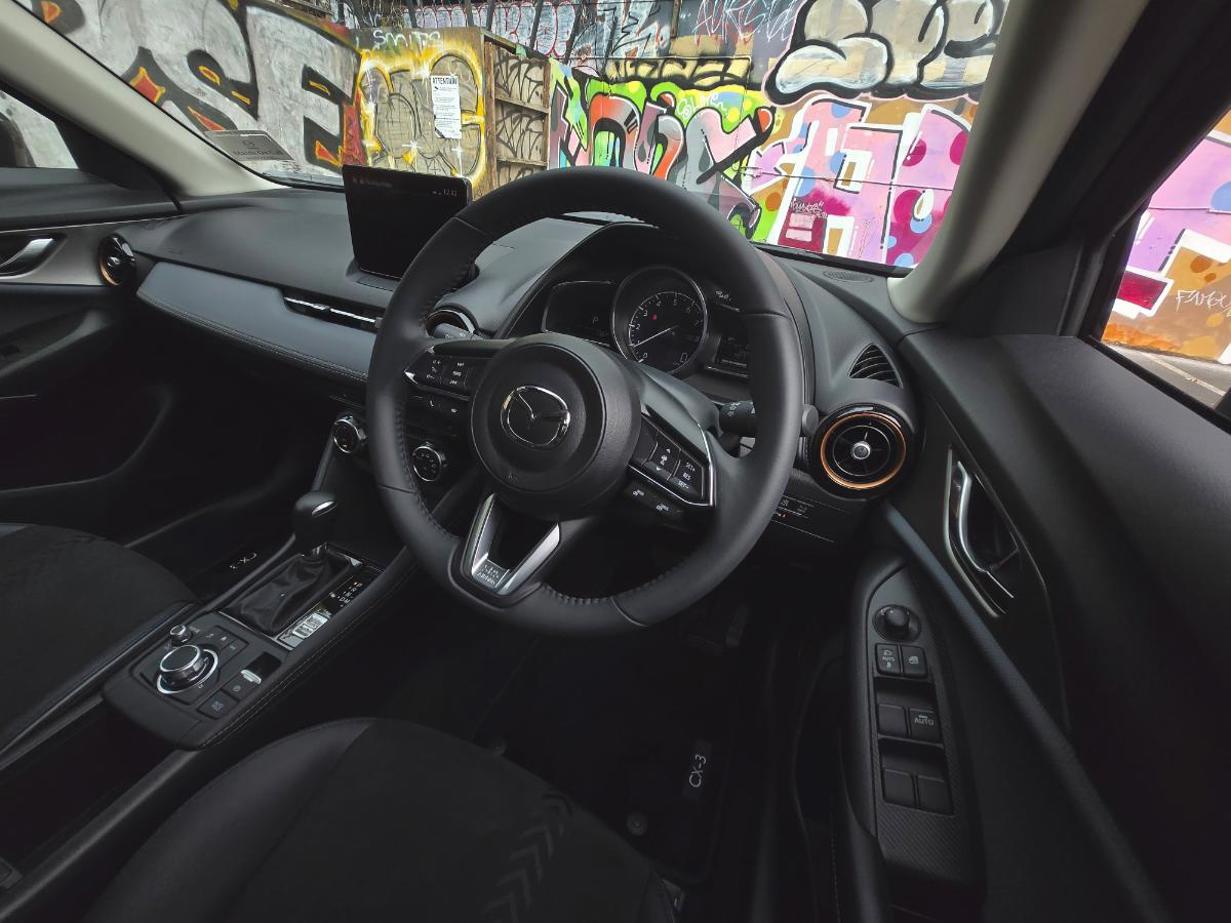
At $42,190, this CX-3-with-everything is indeed a sharp price against other cars in the segment. It joined our fleet straight after a Toyota C-HR, which is of course a vastly more modern car with hybrid technology under the bonnet; but there’s only one version under $50k, the entry-level GX.
Mazda NZ’s warranty and service package is a big dollar-plus for a budget car like this, too. “Mazdacare” is included in the purchase price and brings 5 years of servicing at no extra cost. So that’s another few thousand dollars in the CX-3’s favour.

The CX-3 SP20 sports leather/suede seats with power adjustment/memory for the driver and 3-stage heating on both front chairs. The fit and finish on mainstream Mazdas has always been a cut above anyway, and the little CX-3 still boasts plenty of pleasantly tactile surfaces. No, it’s not premium… but nor does it seem cheap in any way.
Another expectation might be that a 10-year-old design is a bit behind on the latest technology. In some respects, that’s true. The CX-3 is powered by a naturally aspirated 2.0-litre that’s big-capacity by current standards, but still only makes 110kW/195Nm. No electrification of any kind, either. And the automatic transmission is a humble 6-speeder.
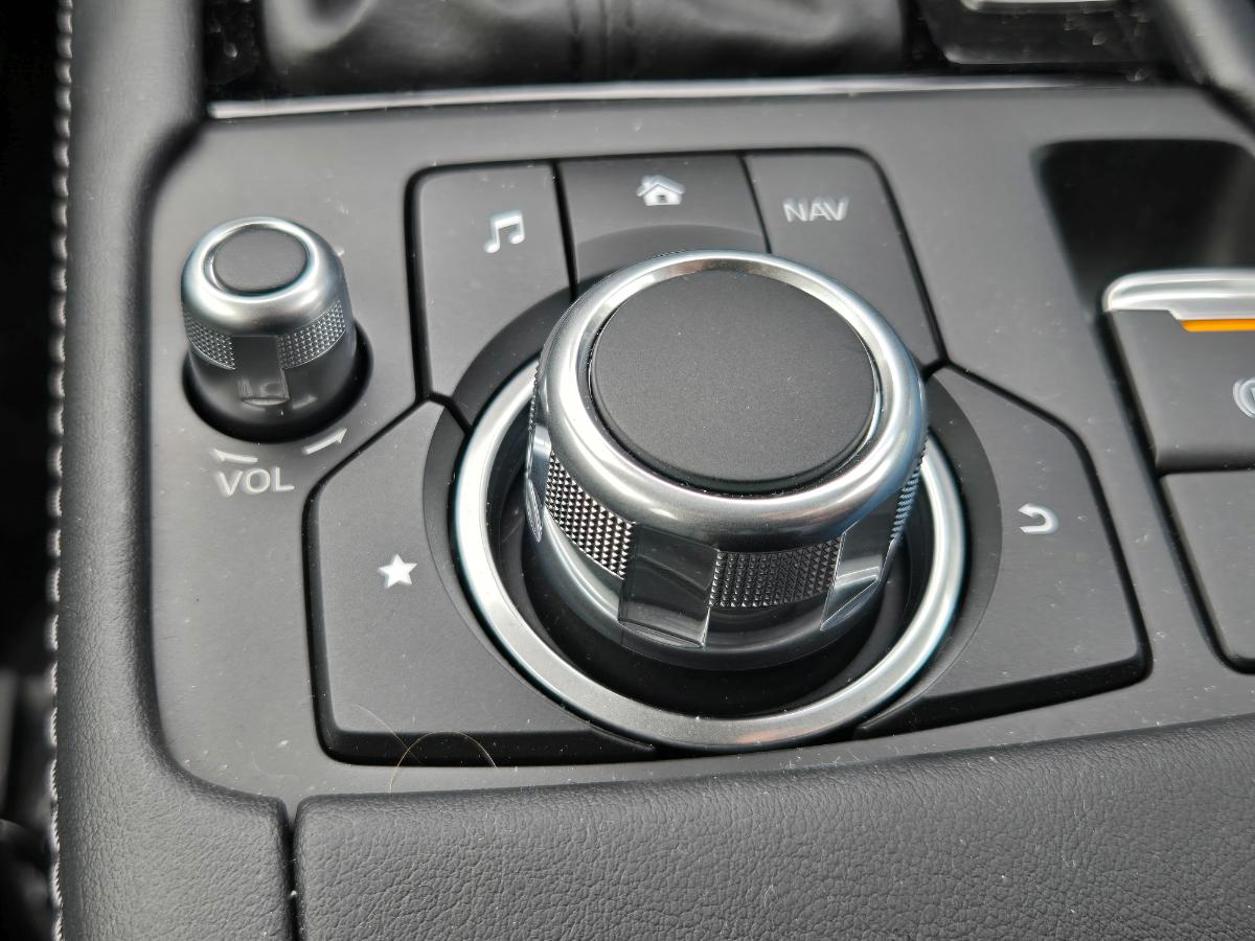
The infotainment has its limitations. The screen has been upsized along the way, but only to 8 inches; the CX-3 has phone projection, but you’ll need a cable for Android Auto and the processing speed isn’t up to scratch. Nor is the odd combination of touch-screen operation (but only when the car is stationary, and never while phone projection is running) and the MZD Connect rotary controller. It’s well out of step with the latest Mazda stuff, that’s for sure. We did get used to it in the end, but it never seemed ideal.
Safety-wise, it’s a better story. The CX-3 has always had autonomous braking, blind-spot alert and lane departure warning (which is a gentle hum rather than a beeping alert, and no steering assistance). Along the way it’s gained extra “smart brake support” functionality, as well as traffic sign recognition (presented in the colour head-up display, rather than the main instrument panel) and stop/go adaptive cruise. No in-car camera though, so no distraction alert beyond a simple warning to take a break after a certain period of driving; we’re okay with that.
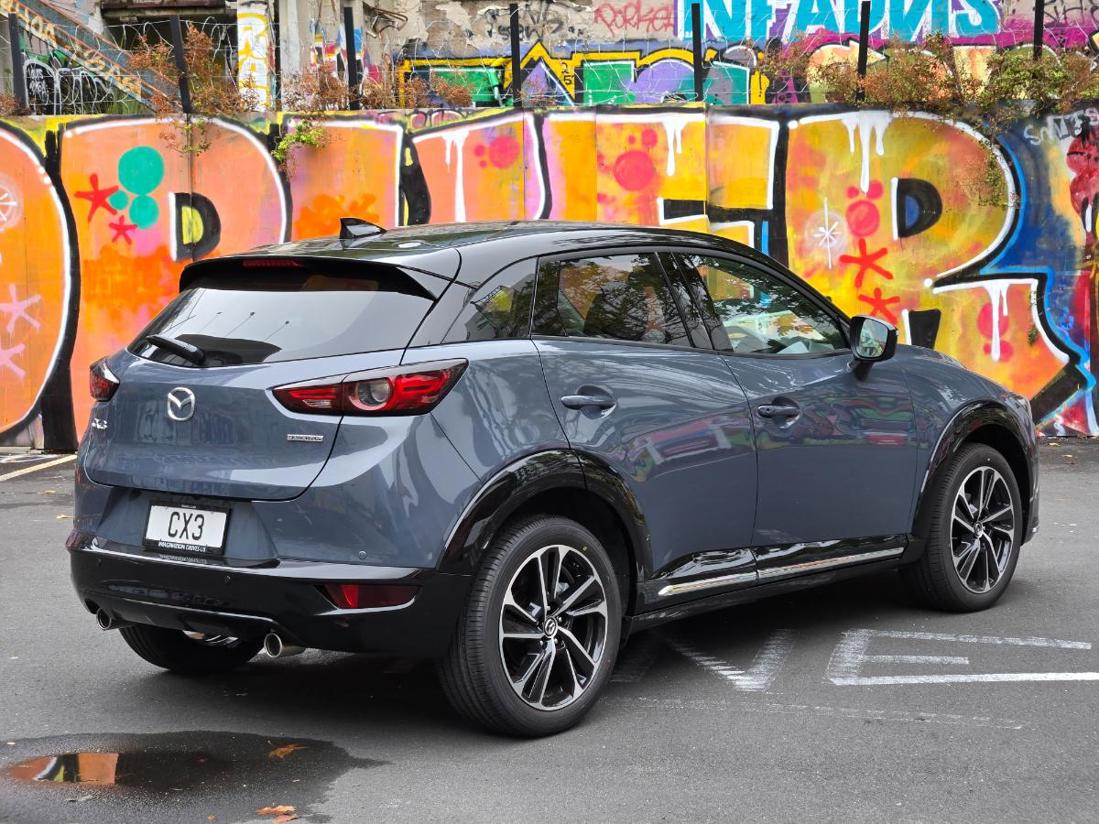
In some cars, that would all add up to an accepting shrug and a sense of “you get what you pay for”. But Mazda has always had a knack of making mainstream cars with more than their share of design and dynamic character. Taking into account all the ups and downs of the CX-3’s decade on the market, what stands out for us is that we really enjoyed our time in the little Mazda, regardless of the type of driving. It never felt like just a commuting tool.
There was plenty of variety. Yes, it did its share of city commuting, with daily drives across the Auckland Harbour Bridge to our central city office, but also at least 4 road trips during its 3 months with us, encompassing everything from the new 110km/h motorway system north of Auckland to some truly challenging backroads.
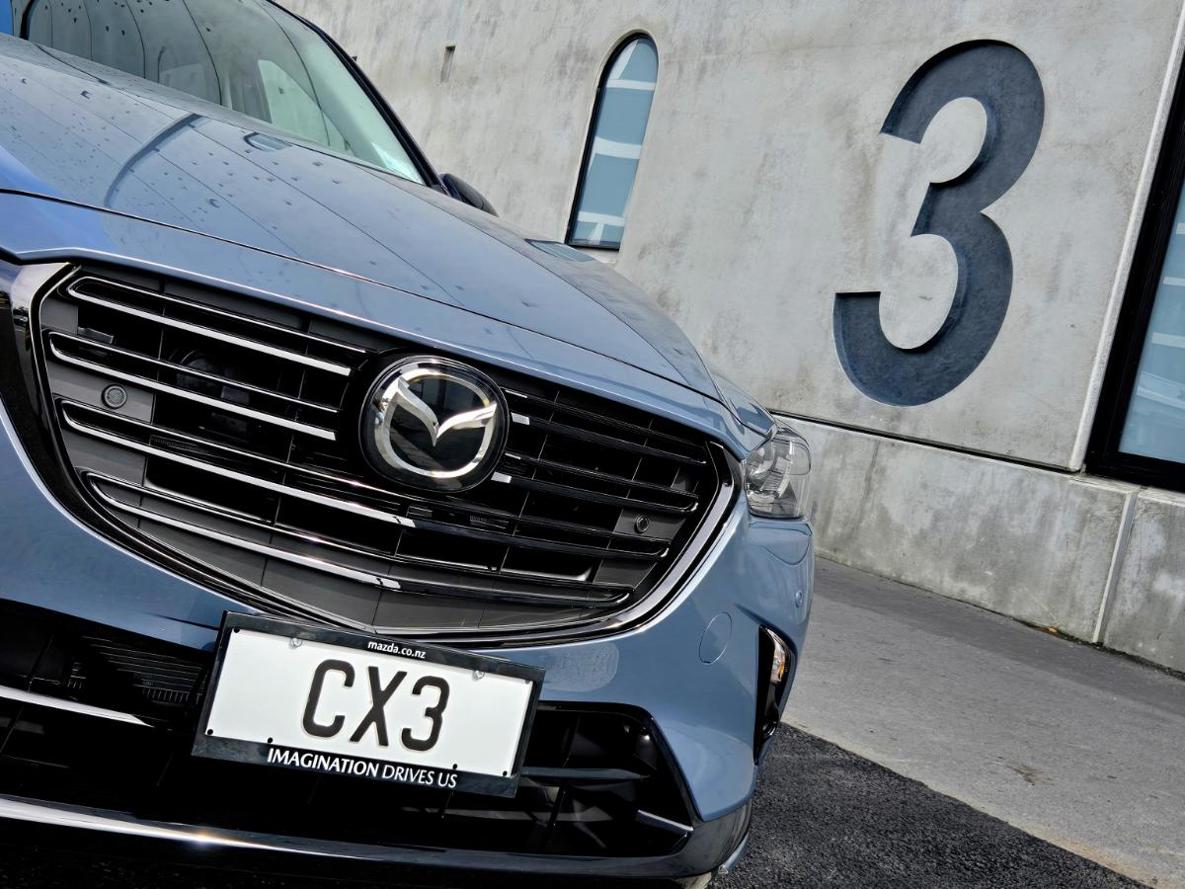
It’s not fast. But it’s hardly slow, with a kerb weight of just 1294kg. The 2.0-litre produces a kind of eager gurgle under load and is happy to rev; the weak point in the powertrain is the 6-speed automatic, which struggles to deploy the power when the engine runs short on pulling power (on cruise control, up a hill, is not a CX-3’s happy place).
But an automatic with fewer-than-ideal ratios is still a lot more engaging (excuse the pun) than the continuously variable transmissions that are more commonplace in small cars these days.
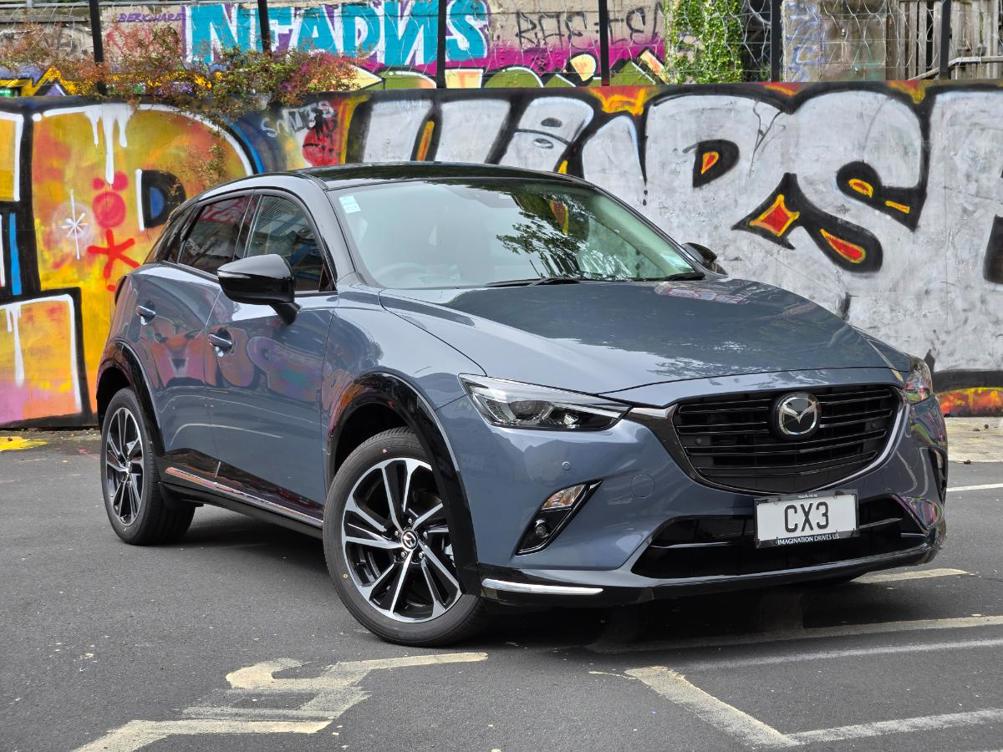
None of the above is conducive to standout fuel economy. Our CX-3 was a touch thirsty in the early days (it had just 33km on the clock when we picked it up), sitting in the 7l-bracket. But once we got past 1500km it improved dramatically, and we finished our review at an overall average of 6.4l/100km. That’s not bad for an old-school ICE, and if you tried really hard you could probably edge it down into the 5l bracket.
We didn’t try that hard, because the CX-3 has such a good chassis. It predates the modern fashion for ultra-light steering and the handling is quite sporty; taut and responsive at speed (okay, it’ll be a fairly modest speed) and certainly capable of putting a smile on your face.
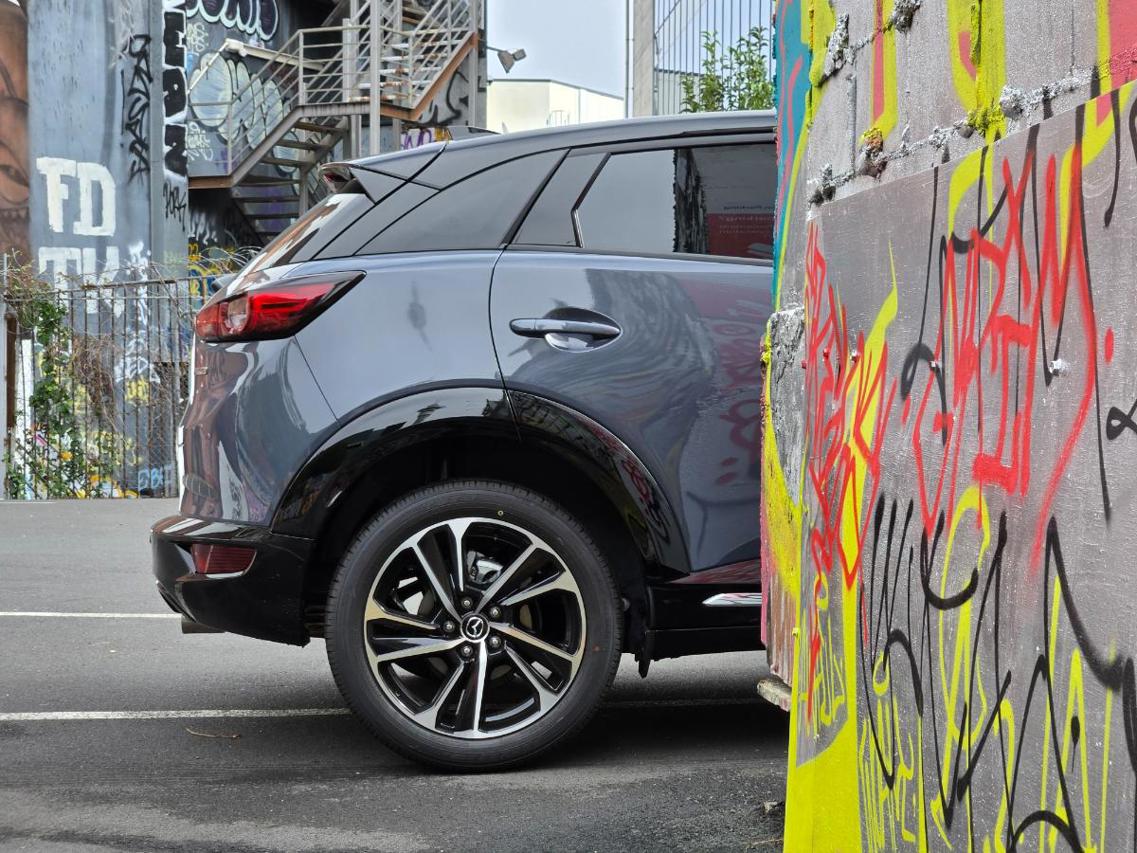
The main limitation to the CX-3’s long-haul legs is seat comfort. Despite the swish trim and racing stripes, the driver’s chair was seriously lacking in support on longer drives; numb bum. Not a deal-breaker though, because it’s not really that kind of car; it’s a city SUV.
Would we recommend the CX-3 SP20? If you’re coming in with your eyes wide open, yes. It’s more traditional than tech-heavy, but many buyers might prefer that. If you’re looking for the top level of driver-assistance (semi-autonomous steering, camera-based cabin monitoring), you won’t find it here; but again, some may prefer that.
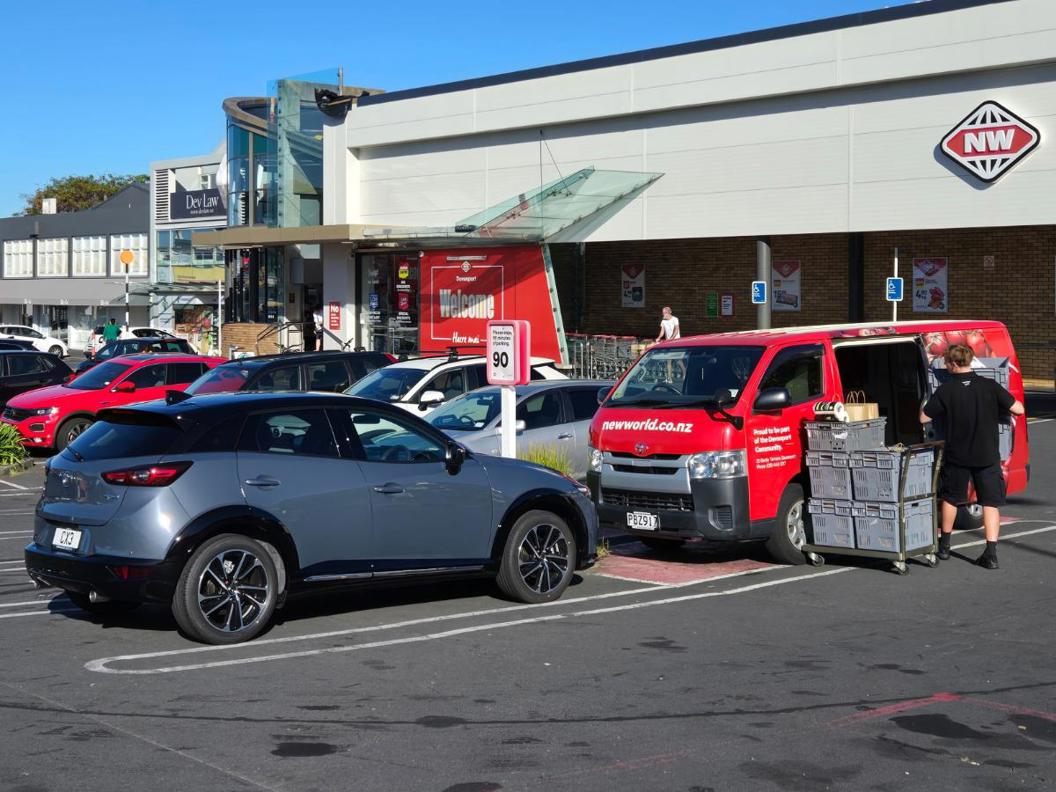
It’s genuinely good value and more importantly based on our time with the car, genuinely good fun to drive. Still sharp-looking, too; it doesn't look out of place next to Mazda’s new-gen SUVs.
It’s often hard to know where to finish with these kinds of stories. Not with a conclusion, because it’s not a primary school essay. So let’s end with something strange.
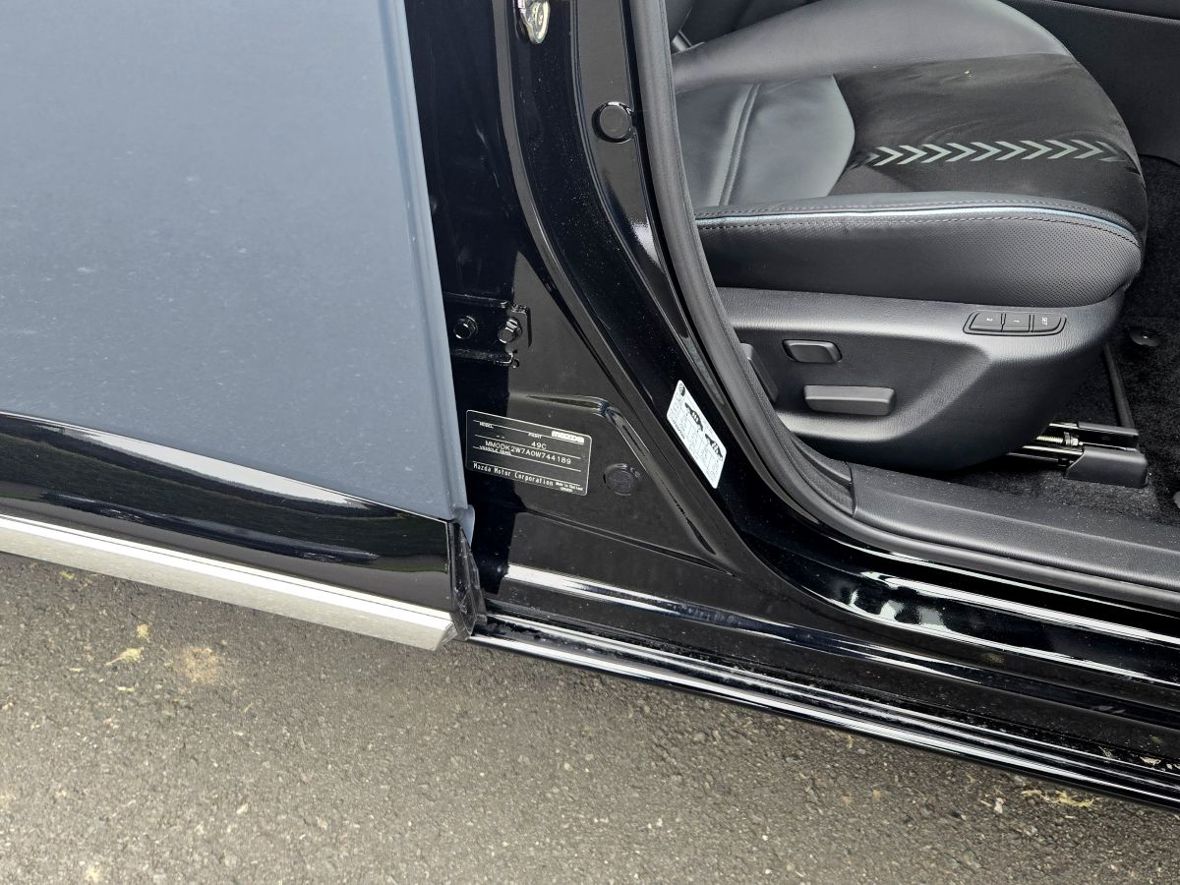
It wasn’t until the end of our time with the CX-3 we noticed that the structure of the car inside the door sill was gloss black; i.e. that's the base colour of the two-tone SP20, with the grey (in our car’s case) over the top. Not exactly a revelation, but a little surprise all the same. The CX-3 has a few of those.
REPORT 5: (17th JULY 2025)
Can we talk carpet for a moment? It’s not something that’s necessarily in your face in a car, mostly because it’s right under your feet. But it can be one of those little things that counts for a lot.
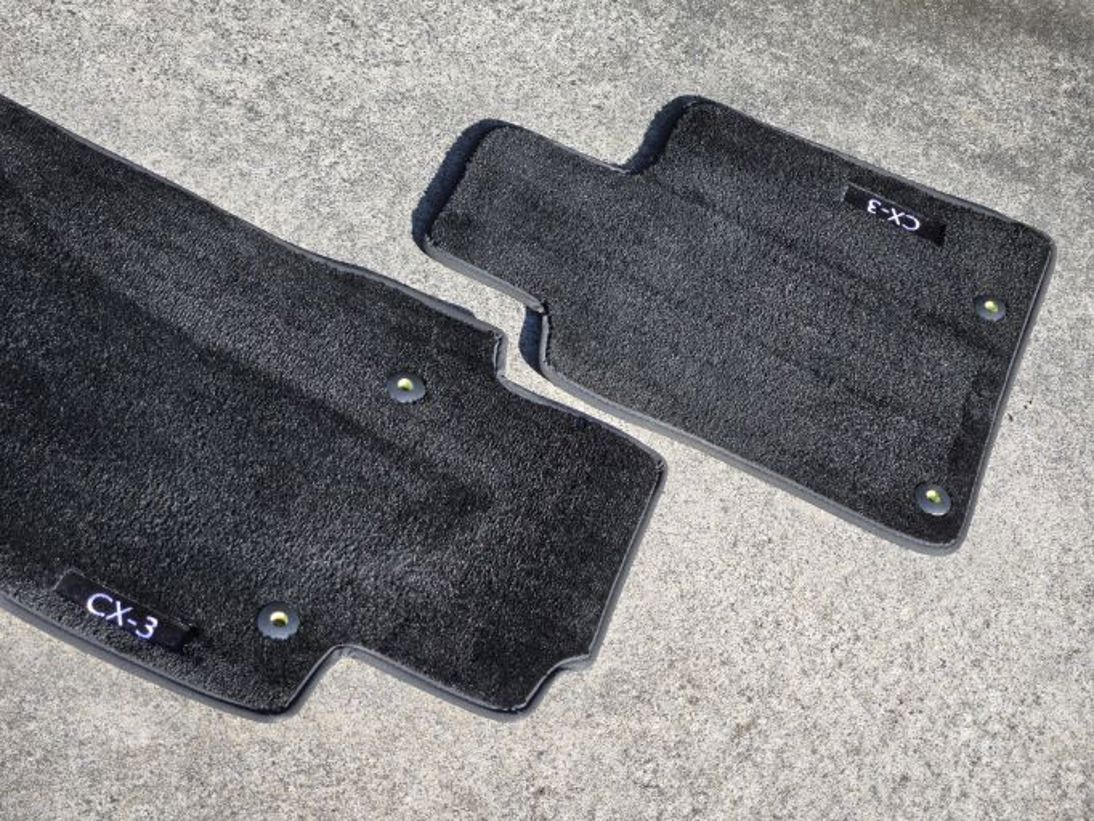
Some Japanese carmakers have a thing for lush carpet, and it’s not necessarily to do with the price or status of the car. Lots of used-import Toyotas and Mazdas have freakishly luxurious pile in the footwells, for example. Although among new-cars, I’d still have to say premium-brand Lexus is top for carpet that makes your toes croon.
Anyway, this all kind of popped into my head the other day when the mats from our extended-review Mazda CX-3 SP20 were quite literally in my face. I was giving the little grey guy a deep clean after an especially dirty weekend (yes, we do wash test cars, thank you very much) and noticed how thick the pile was on the official Mazda mats as I went all Dyson-direct on them.
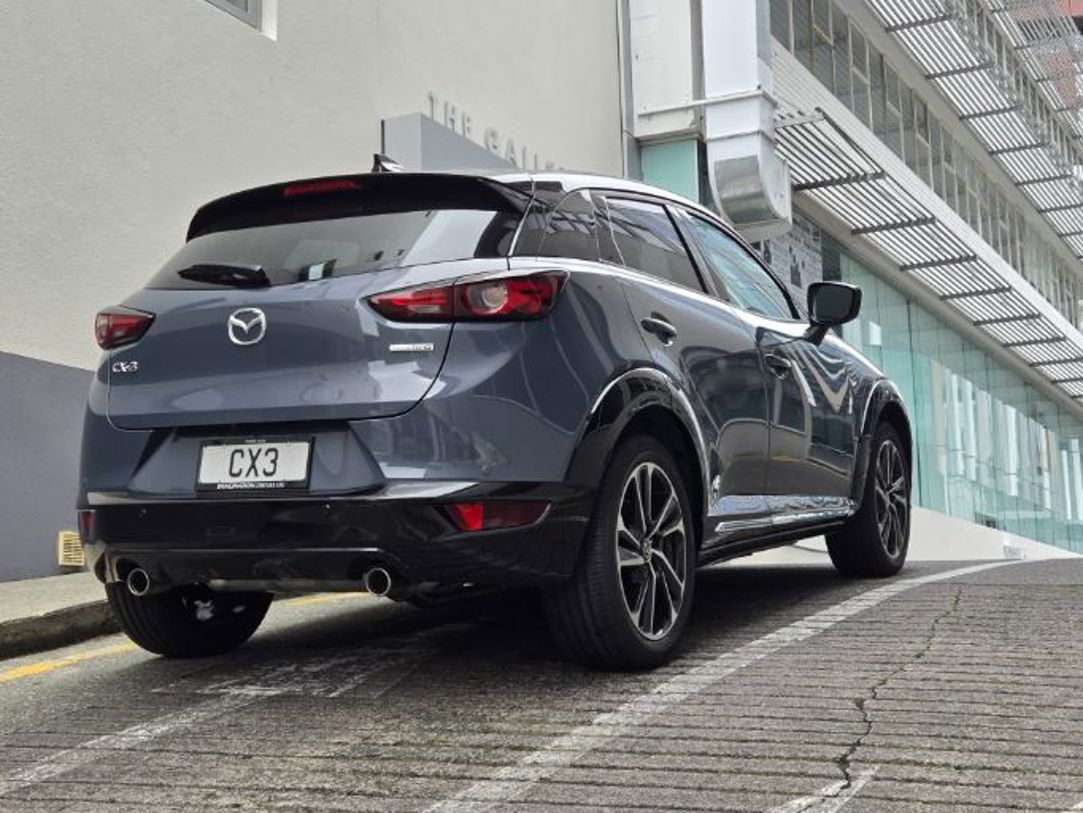
If you’re not into carpet per-se, consider it a metaphor for the surprisingly high standard of fit and finish evident in this $42k compact SUV. Mazdas of the last 20 years have generally impressed for their premium-themed interiors, and even though the CX-3 isn’t all soft-touch surfaces and tactile trim, there are a number of surprisingly swish little details that catch your eye. Or toes.
Okay, they’re only mats. But they’re the official Mazda mats and actually, underneath them, the lining in the footwell also has a top-quality feel.
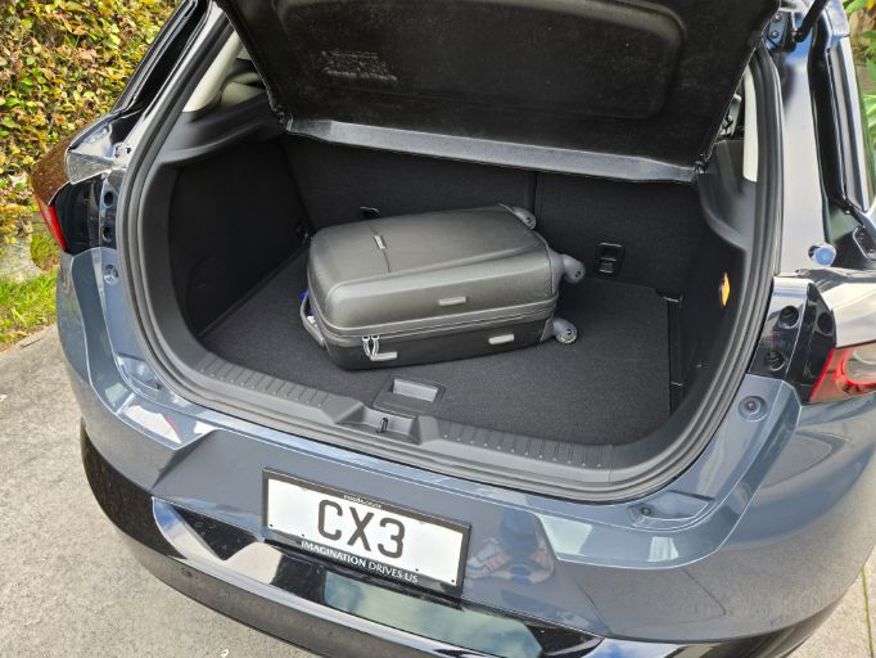
The boot, too. Especially the boot. The Mazda has done quite a few airport runs (as we’ve often said, that’s a KPI for any extended-test car) and my sturdy Samsonite suitcase has spent quite a bit of its recent life sliding around the cargo area of the CX-3. Which has emerged looking smooth and unsullied.
Big deal, you might think, because that’s what a boot is for. Agreed.
But I did recently undertake a similar airport run in a European SUV costing well over twice as much as the Mazda, and the suitcase left some alarming marks on the cargo-floor. Enough to prompt me to remove it and give it the full wipedown/vacuum/fluff-up once-over; which didn’t really help, because the upholstery was just so thin and low-quality. A $42k Mazda is setting benchmarks in ways we’d never even thought about.
REPORT 4: (2nd JULY 2025)
Nobody seriously makes a car-purchasing decision based on the quality of the infotainment system. Oh hang on, lots of people very much do.
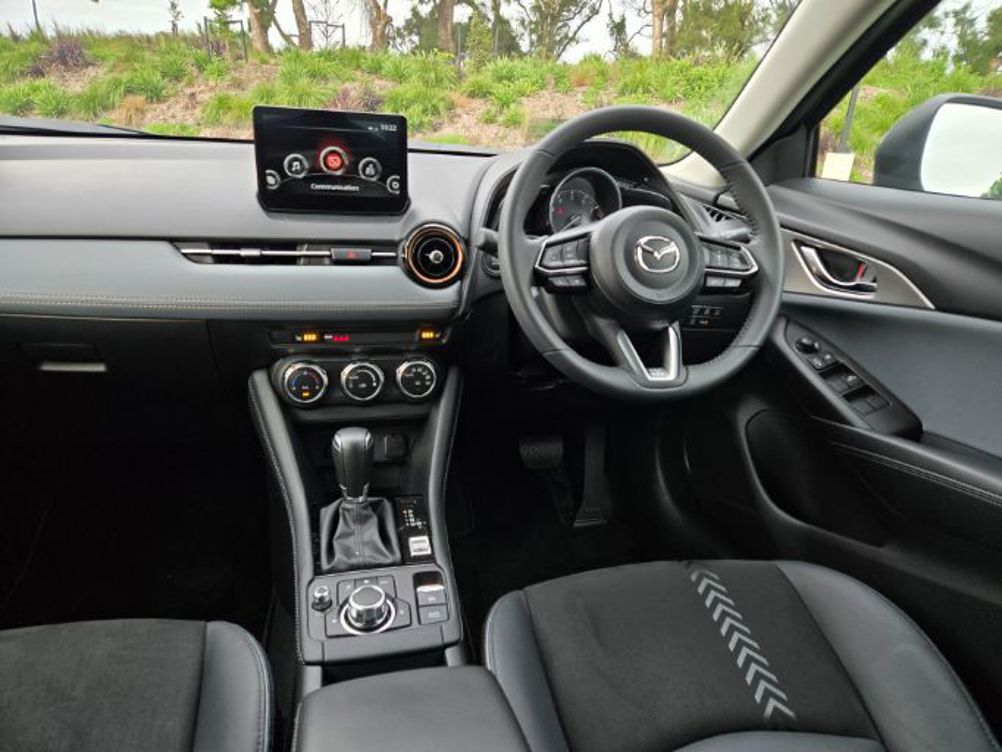
The “MZD Connect” system fitted to our Mazda CX-3 has its challenges. It was the latest thing when the CX-3 was launched in 2015, but also an example of Mazda being a bit stubborn in doing things its own way.
It’s a touch-screen that’s operated in combination with a set of BMW iDrive-style controls, including a central rotary dial and shortcuts for the home screen, entertainment, navigation and the like. The native OS is nice and simple, with an arc of menus that you scroll through. Which all sounds pretty good.
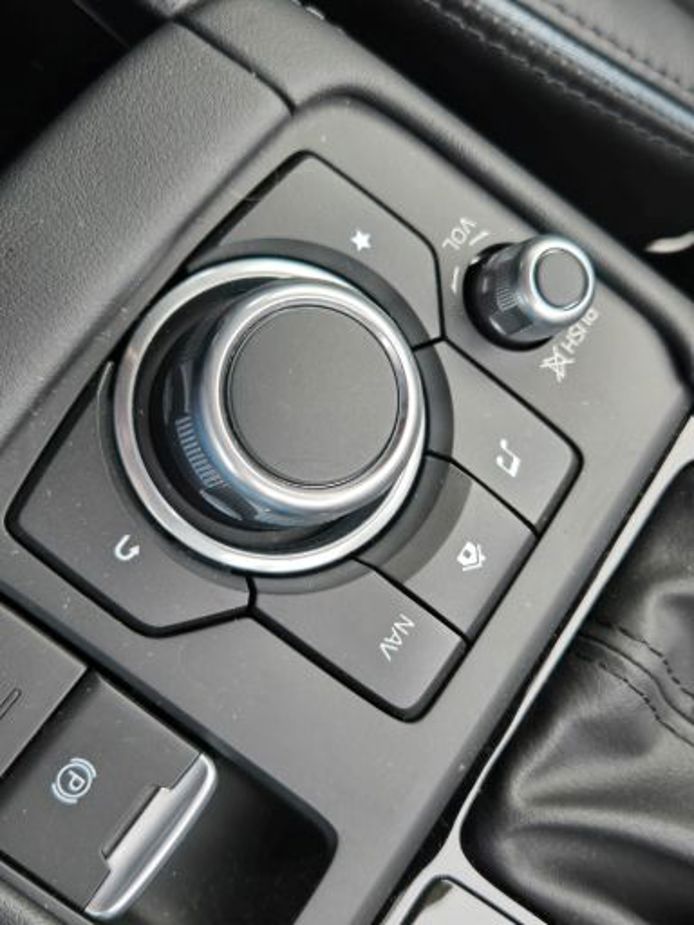
Enter Mazda and its… ideas. The touch-functionality only works when the car is stationary, which is ostensibly for safety but actually quite annoying; and not really safer we’d argue, as either way you have to stare at the screen to see what you're doing.
The physical dial and shortcuts are nicely located and have a positive action, but it’s still a bit laborious to navigate your way around the screen when you know there’s touch-functionality the car is denying you.
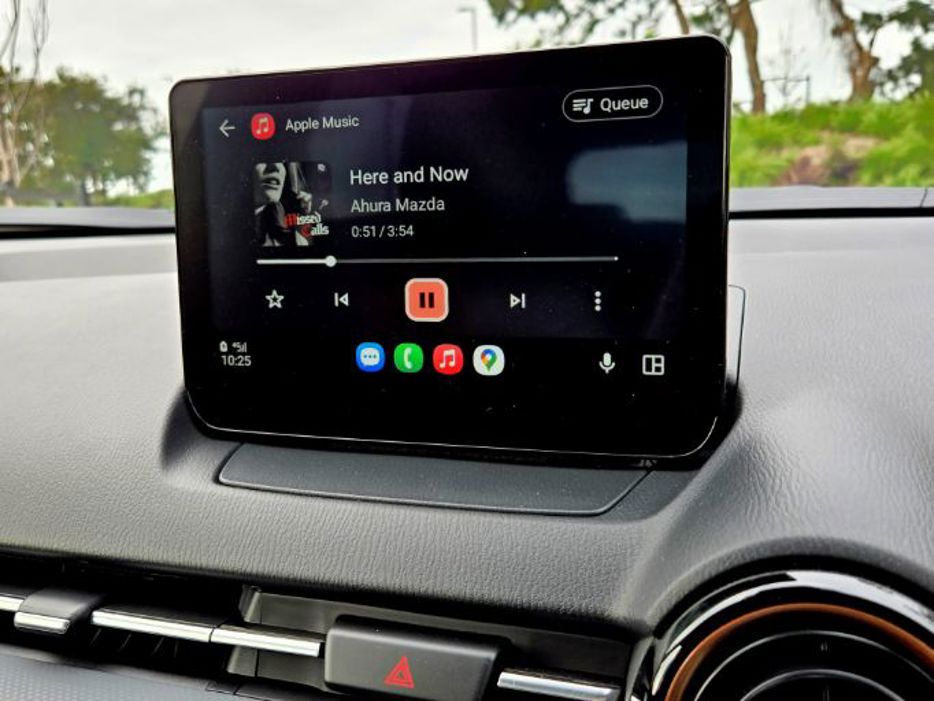
Mazda was a bit of a phone-projection denier for a while there (not as stubborn as Toyota, though), but it did retcon Apple CarPlay (wireless) and Android Auto (you need a cable for that) to the CX-3 MZD Connect in 2021.
We’re glad it’s there, but it does exacerbate the fiddly nature of the whole setup, especially when you discover that the touch-screen doesn’t work with projection even when the car is stationary. So much for inputting that sat-nav destination speedily before you depart (although you can of course use voice command via Google, which works pretty well).
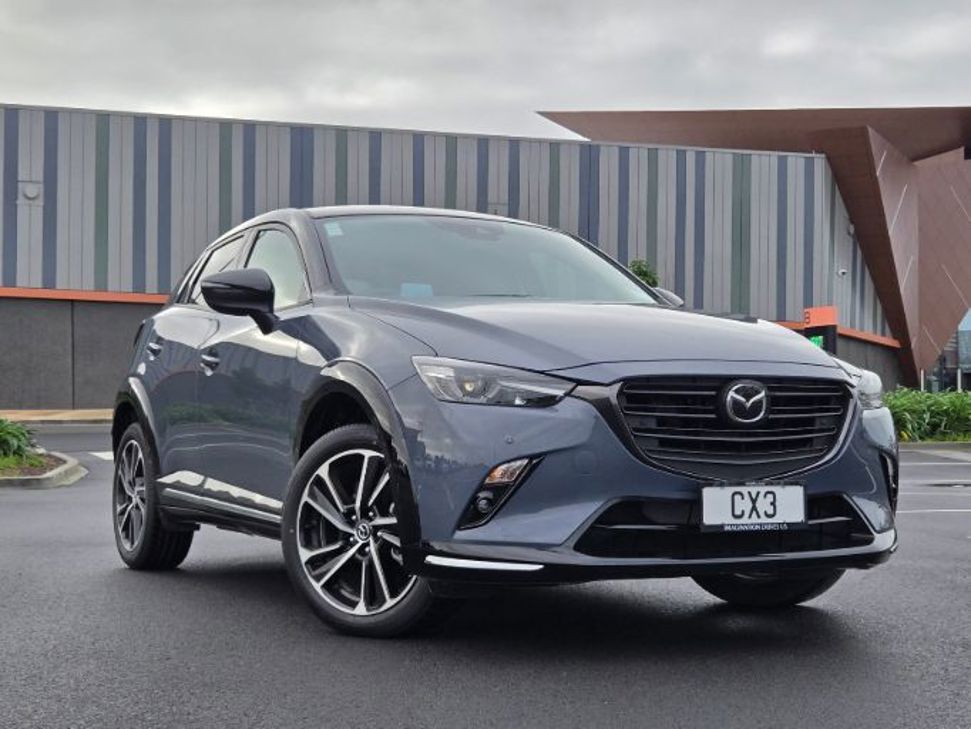
One final moan: the system sometimes struggles to get things up and running. From plugging in an Android phone to full activation on the screen takes about 30 seconds. Which doesn’t sound like a lot, but try counting it out; you’ve driven a block or two before you’re got your music and/or Google Maps running.
It’s probably not as bad as we’re making out; in fact, we’ve become quite handy with the twist-and-click physical controls during our time with the CX-3. But still not ideal.
Mazda has phased out MZD Connect in favour of a slicker new setup simply called “Mazda Connect” in its latest models, which does allow you to use touch on the move with phone projection. Just saying.
In other news, we’ve ticked over 1500km. With many cars, that’d be a visit to the dealership for a quick check as part of the required service schedule, but with the CX-3 there’s nothing needed until 15,000km or 12 months. And like all the brand’s New Zealand-new models, it’s covered by the free Mazdacare 5-year service plan; well, probably not free, because obviously you’ve paid for it as a component of the purchase price. But when that price is $42,190, it’s a good deal.
REPORT 3: (13th JUNE 2025)
Mileage: 1233km
Fieldays is an annual event for the DRIVEN Car Guide team. It’s the closest thing to a car-show we have and, just for the record, our parent company NZME is a major sponsor via The Country. Even when Fieldays knocks me back for a media pass, which it did this year. No hard feelings. Maybe.
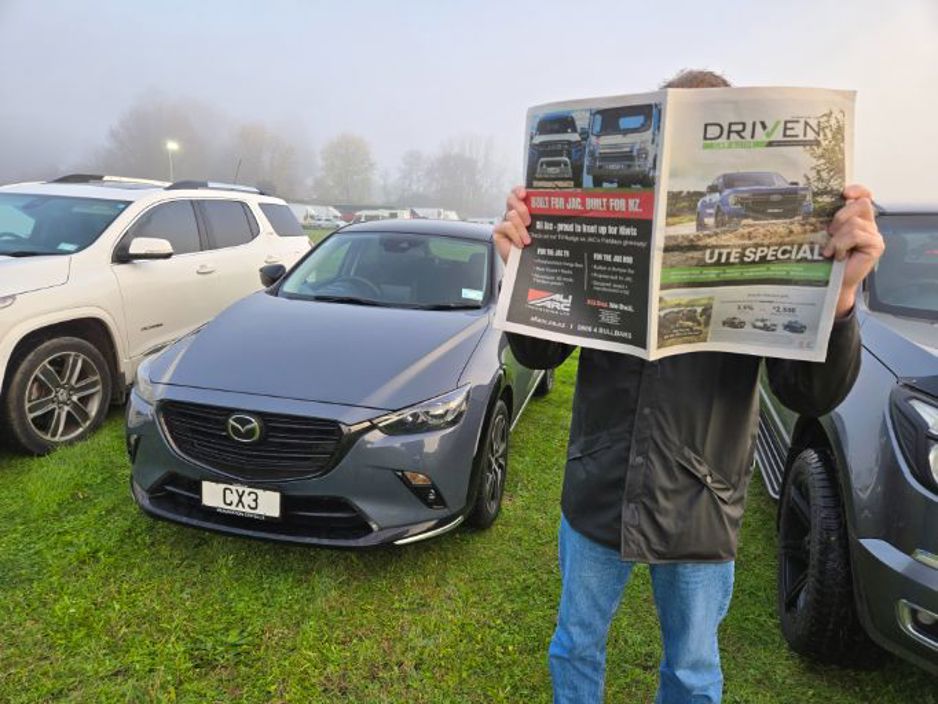
Anyway, we usually take a long-term test car down, because it makes it all feel like more of a team task. Last year it was a Suzuki Jimny; this year, step up Mazda CX-3.
It might be a city-SUV with a tiny 264-litre boot, but our little Mazda had some proper work to do: carry bundles of our Ute Special print issue for The Country stand in the main pavilion, and to distribute around the place in general.
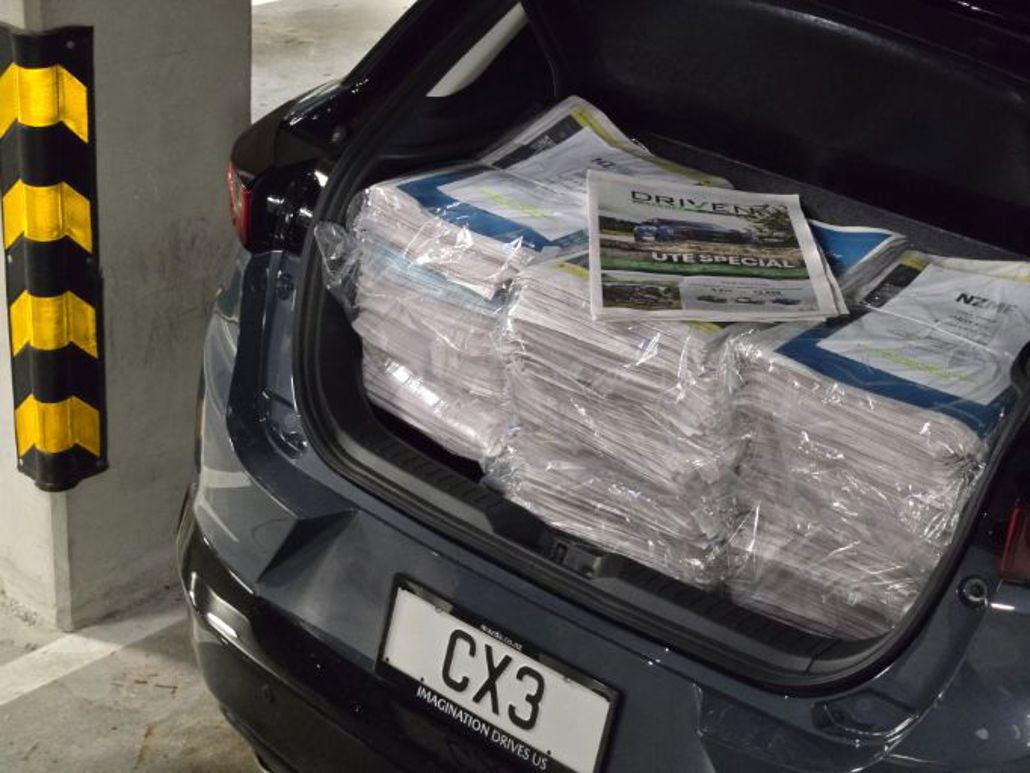
There was yet more excitement just after departure, when the CX-3 clicked over 1000km. Is it desperately nerdy to get excited about that in a new car? Well, we do.
A good drive down in the darkness to make the 8am Fieldays opening time, with due appreciation for the CX-3’s radar cruise control and superheated front seats (standard on the SP20); yeah, they get really hot, really fast.
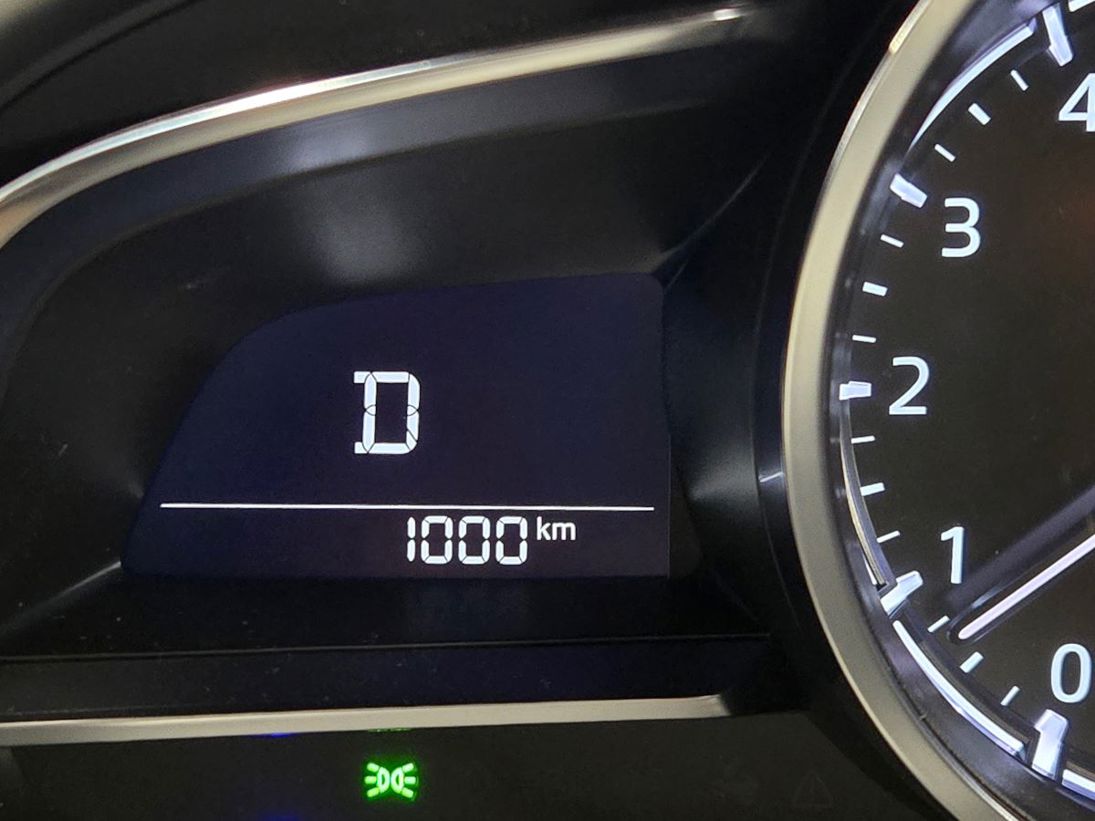
The driver’s seat has 2-position memory as well, which is quite a high-end feature for a baby car. Handy, as it allows both of us in the Auckland office to switch in and out of the car with minimum hassle, like so many similar… um… households.
Our trip was interrupted only by a mystery warning “bing” about half-way from Auckland to Hamilton, which may or may not have been related to a tyre pressure warning that popped up a few minutes later. A quick check at the next motorway service area and all was fine rubber-wise; might have been temperature-related. We got another audible alert on the way back too, but no tyre warning. Huh.
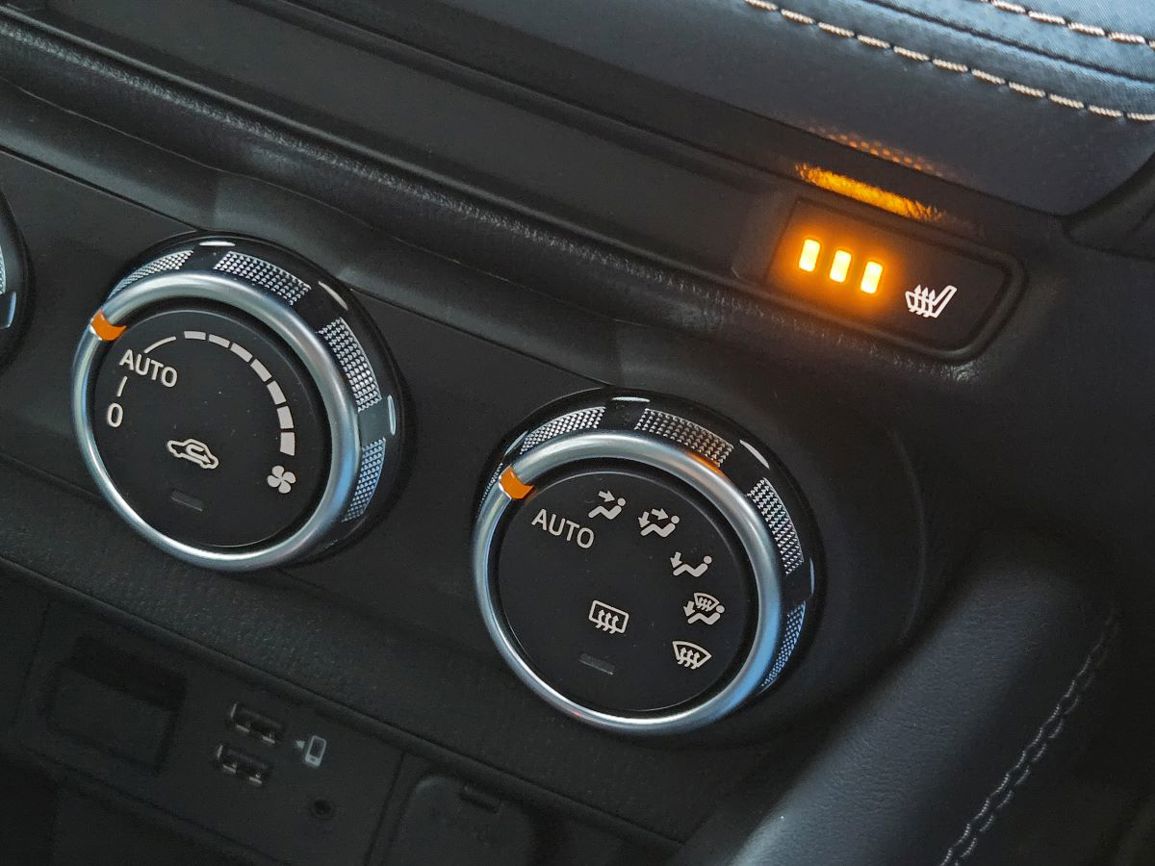
I did almost the same trip when the CX-3 was brand-new, so it was a good chance to do a little fuel-economy check. Not on the way down obviously, with all that precious cargo, but we reset the trip computer on the homeward leg and even with an extra person on board, the CX-3 averaged 6.5l/100 for the trip: exactly one litre better than my first trip. Amazing what a difference 1000km can make; and pretty impressive for a relatively large-capacity 2.0-litre engine with no electrification and a conventional automatic gearbox.
Our initial impressions about the 6-speed automatic hunting a bit on gentle inclines remain, although it doesn’t seem to have a negative effect on fuel economy - and like we said, the radar cruise does a pretty good job.
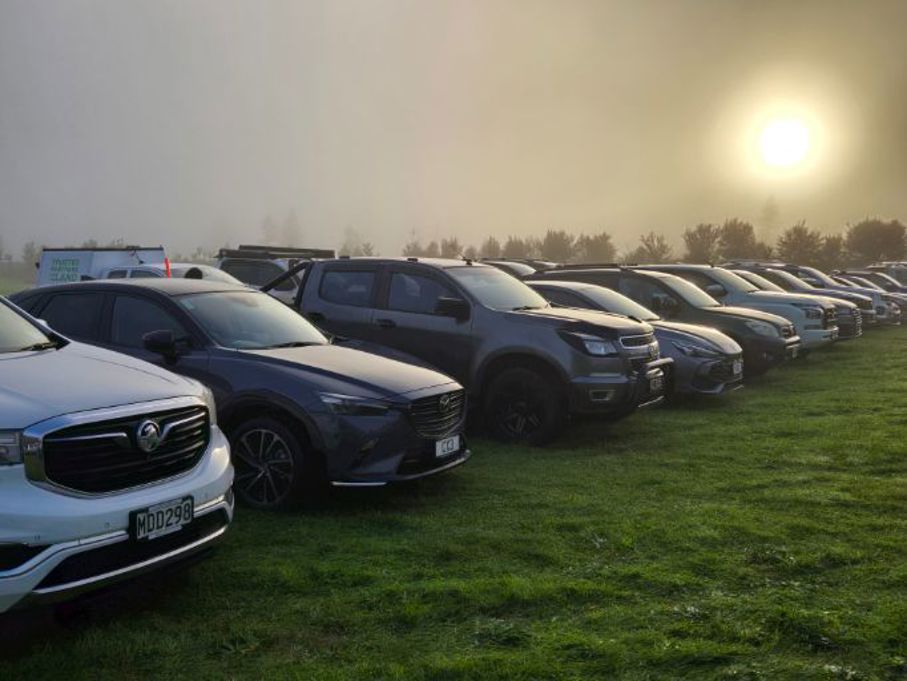
It all seems to be happier at 100km/h than 110km/h, though; reckon we could have been down in the 5l-bracket if we’d stayed well left on the faster bits of the Waikato Expressway.
And while we love the sizzling seats on these winter mornings, extended time in the car is producing numb-bums. While the chairs look sporty, they’re a bit short on squab-support. But like we said, it’s an urban-SUV, not an inter-city express. It’s good to take a little car out its comfort zone sometimes.
REPORT 2: (22nd MAY 2025)
Mileage: 583km
We don’t generally give our long-term cars the full road-test treatment. That’s partly because they’re mostly new models that have done the review-rounds quite recently, and partly because that’s not strictly what long-term tests are about. The idea is to live with the vehicle on a day-to-day basis, learn as you go and do, well, normal stuff with it.

Our Mazda CX-3 is a slightly different case. As we’ve settled into the little SUV we’ve become ever-more-aware that it’s been a while. Like, about a decade. And it’s important to have a good frame of reference, so we’ve made a special effort this month to get out on a couple of drive loops we often use to evaluate normal-review cars, just to see how this model (which has been on the market since 2015) shapes up against the latest stuff. A couple of let’s-get-acquainted outings.
As you might expect, the CX-3 is technologically modest in a 2025 context: the 2.0-litre engine is large-capacity by class standards but makes just 110kW/195Nm. That’s on-par with many rivals, but remember the Mazda doesn’t have torque/economy-enhancing electrification or a continuously variable transmission (CVT); instead, it sticks with a conventional 6-speed automatic.
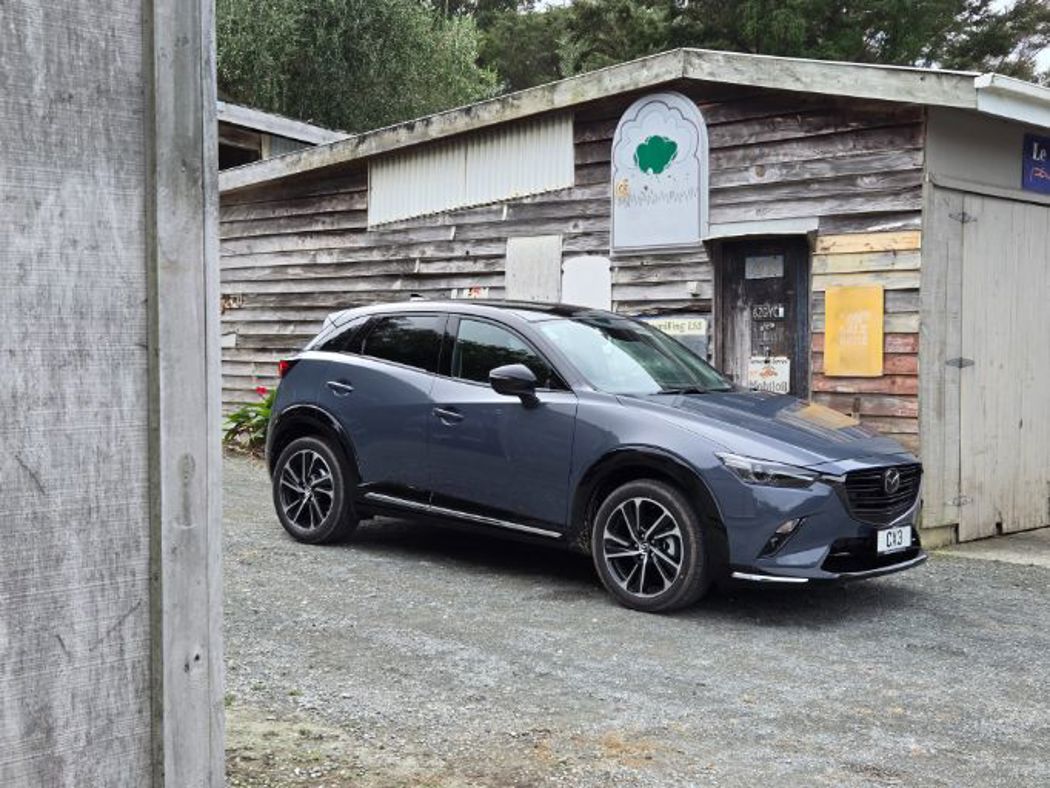
In practice, the performance feels quite perky at times, the 2.0-litre engine doing its thing with a gurgly kind of urgency. There’s no denying that a CVT is efficient and extracts the maximum range of performance from a small car; but there’s equally no denying that people who enjoy driving will always find actual gears more… engaging.
That’s the case with our Mazda. The automatic is smooth and enjoyable, although it could benefit from another ratio or two; we’ve done a couple of motorway runs from Auckland north to Matakana, and with the cruise on at 100km/h there’s a lot of hunting from the gearbox on inclines to keep the car in the right speed zone. It just seems like the gaps between gears are a bit too wide at times.
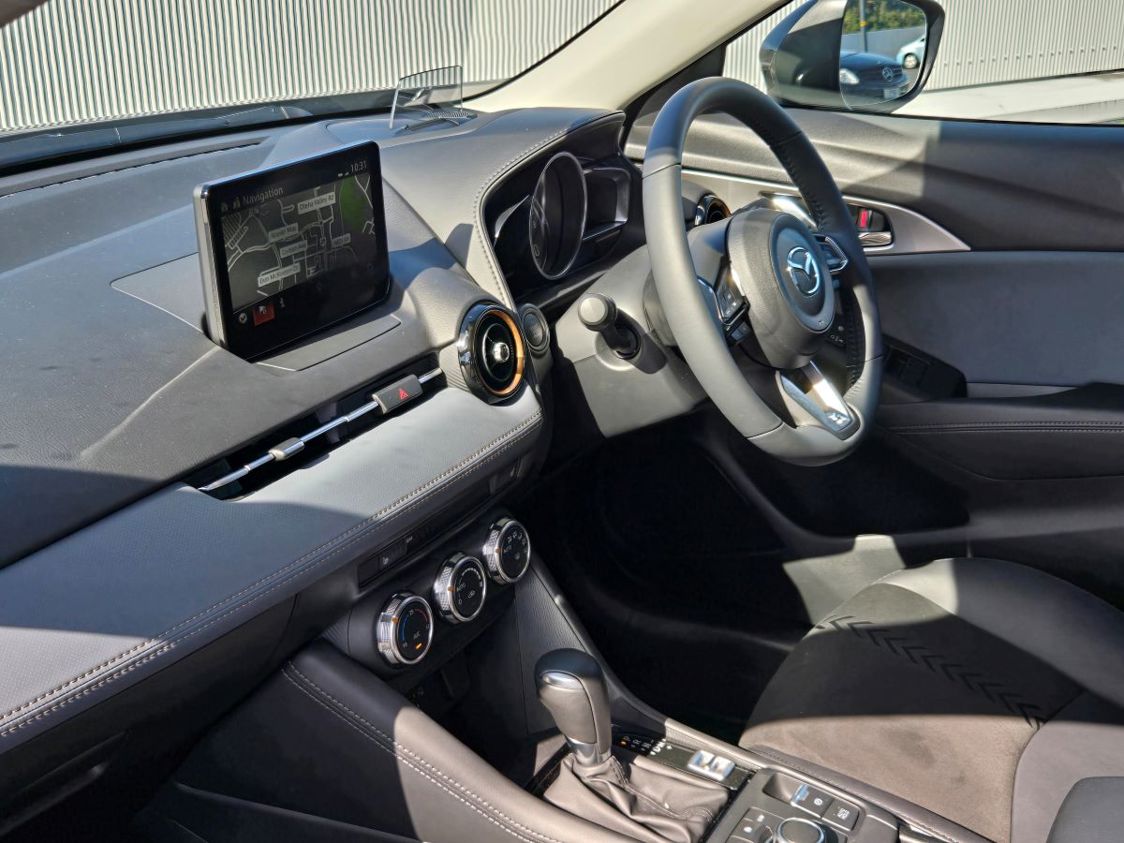
All of the above means the little Mazda can’t compete with electrified/CVT models for fuel economy. We’re averaging 7.5l/100km at the moment (not far from the official 3P-WLTP of 7.0l/100km); even bearing in mind that this car was absolutely brand-new when we picked it up, that’s still 3 litres more than our last urban-SUV long-termer, the Toyota C-HR Limited. Mind you, our top-spec FWD C-HR Limited cost $54,990; our top-spec Mazda CX-3 is $42,190.
Mazda has long been a maker with a reputation for making mainstream cars that handle with considerable finesse. The CX-3 comes from a time when it was deep into its SkActiv low-friction/lightweight construction (following on from the acclaimed CX-5) and a general focus on dynamic excellence.
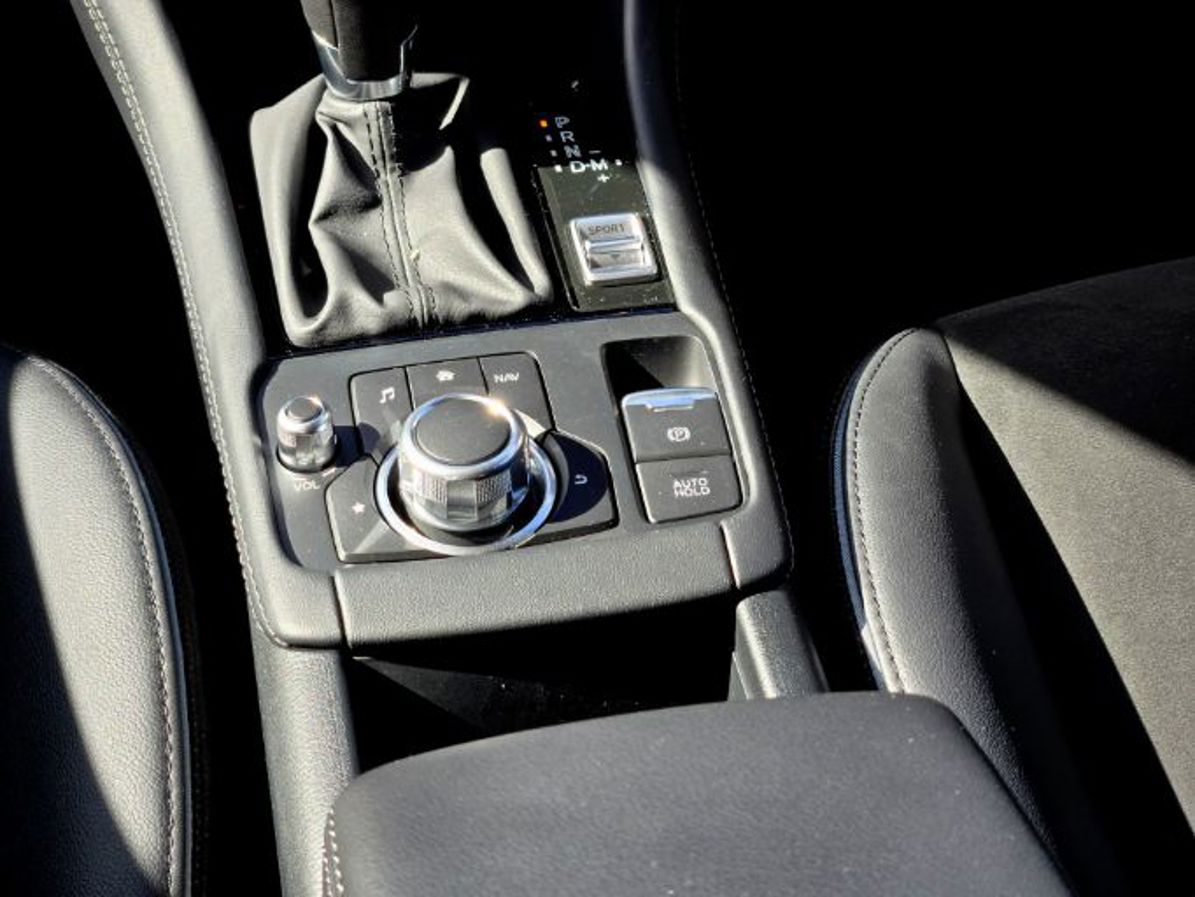
Guess what? The CX-3 is still brilliant to drive. The current fashion for family SUVs is super-light steering, partly because it makes stuff like automatic lane-assist easier to integrate and partly because it’s just what people expect these days. The CX-3 doesn’t have that level of assistance (although it’s well-served with other active safety equipment, including lane-departure warning), but it does offer steering that’s relatively weighty, with decent feedback when you need it. That might not be to all tastes these days, but we’re fans.
It helps that the chassis is so good. The CX-3 is grippy, stable, responsive and often just-plain-fun in tight corners. Despite the short wheelbase, it hangs on tenaciously in turns and holds its line even when you do silly things with the throttle, like lift-off mid-corner. It’s really impressive.
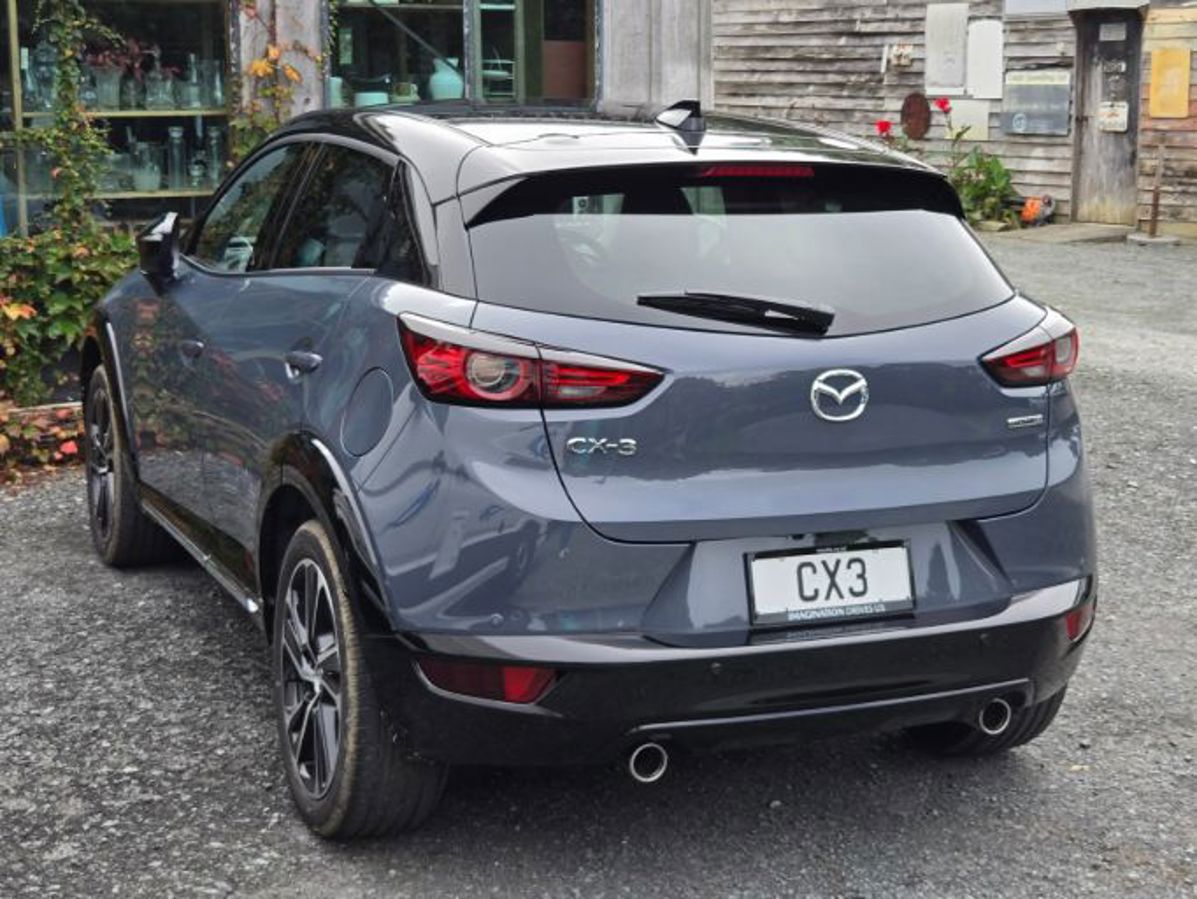
There’s even a Sport mode offered on a slender silver switch on the centre console, although it’s an odd thing. It doesn’t do a whole lot in city driving, but when you’re out on open road it seems to lock out top gear, which is not ideal because things get pretty busy, pretty quickly. Possibly for that reason, the car does not allow you to select Sport when the adaptive cruise control is running. To be honest, the CX-3 is more sporty-feeling if you keep it in Normal.
Thanks to that dynamic character and the CX-3’s pert good looks, when it was launched launched we often said it would be a very appropriate base for a sporty MPS-style (remember MPS?) model. We still think that.
REPORT 1: (2nd MAY 2025)
Mileage: 33km
A major topic of discussion in the DRIVEN Car Guide office this year: models that we haven’t reviewed for years, but are still consistently popular among Kiwi buyers. Yep, we’re a fun crowd to be around.

It’s the nature of the job that we mainly review cars that are box-fresh and just released; because news value usually drives stories and on a purely pragmatic level, they’re the ones that car brands send around for evaluation. That’s just the way things work.
But we’ve been on a bit of mission in 2025 to bring our road-test database up-to-date around cars that are popular with buyers, but aren’t brand new. Cars like the Kia Seltos and Mitsubishi Eclipse Cross are good examples.
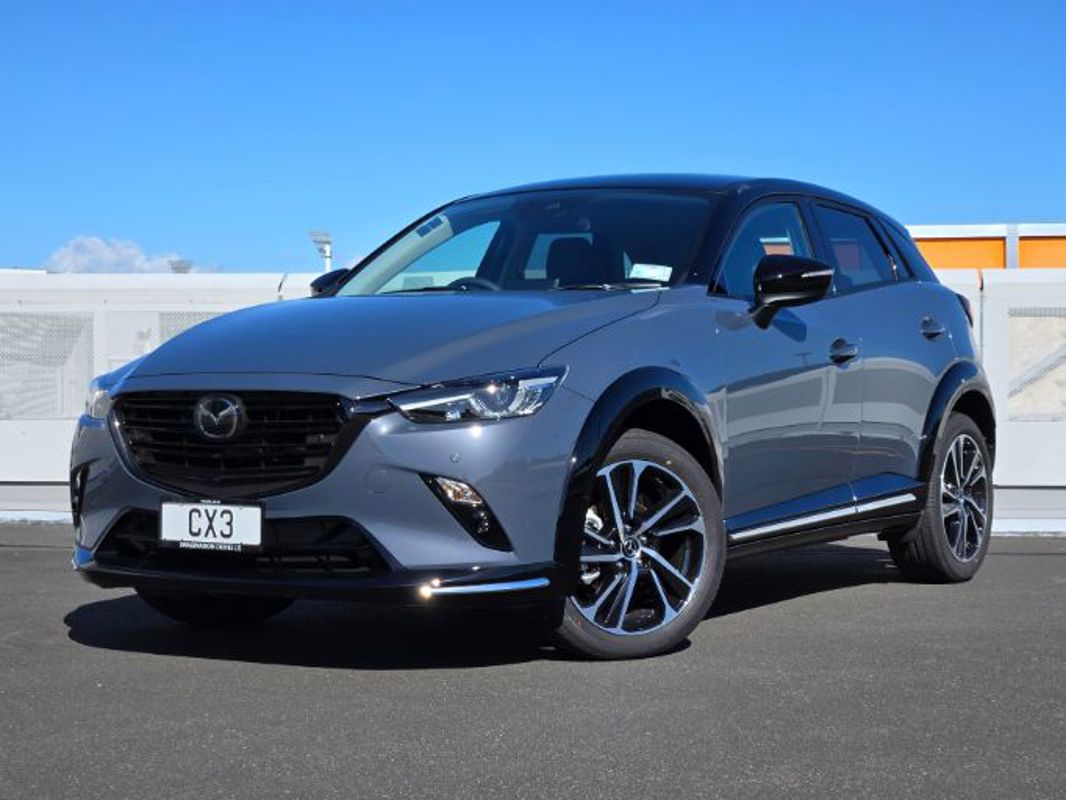
We’ve been especially keen to get back into a Mazda CX-3, because it’s a model that’s been on the market for more than a decade (overall DRIVEN COTY for 2015, no less) and still consistently popular in the Mazda portfolio. It's a modest 10% of the overall mix, but showing no sign of fading away. It keeps ticking along.
It’s not always easy securing a more established model for review, simply because brands don’t have them on the fleet any more.
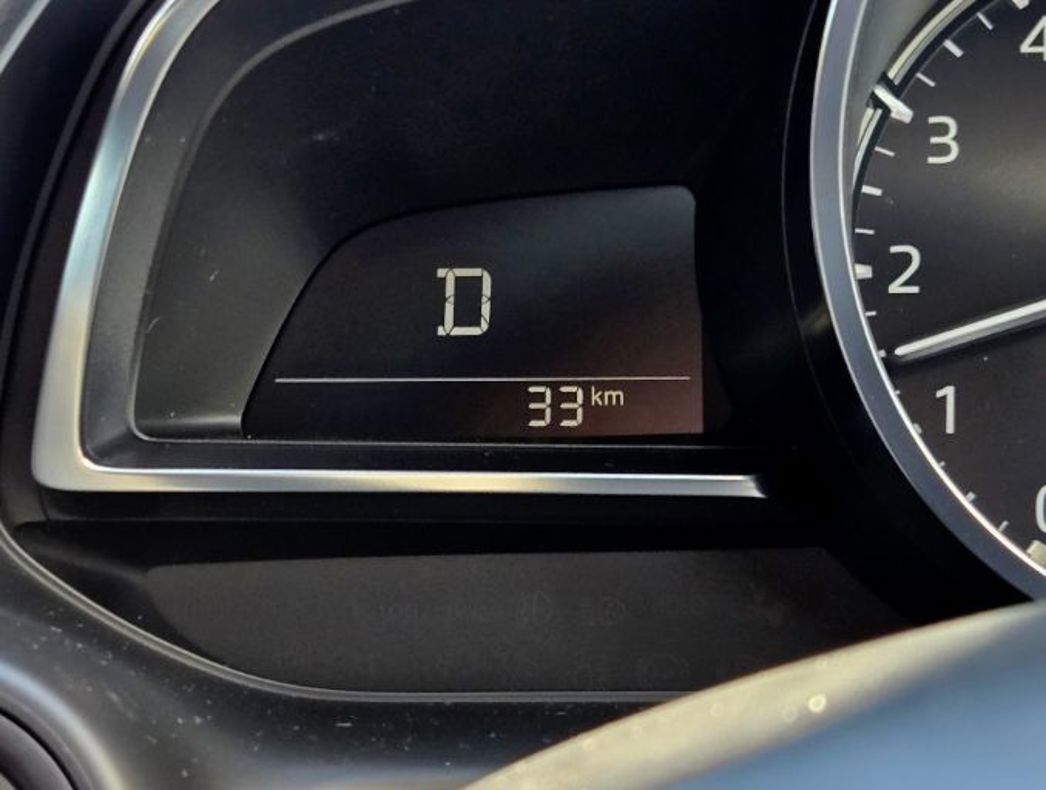
When we approached Mazda about a CX-3, the company came back with a broader idea: a long-term test rather than a week-long review, which might be a better way to understand why this car still attracts a loyal following.
Done. So here it is: fresh off the boat, a CX-3 SP20 with just 33km on the clock. That’s already a novelty; we don’t often get a car to drive that’s genuinely brand-new; it's like being a real CX-3 buyer.

We reckon the CX-3 still looks pretty good after all these years, familiar as it is. Ours is the flagship SP20 model, identified by its gloss-black exterior details (other CX-3s have unpainted plastic wheelarch flares, for example) and two-tone paintjob with Brilliant Black roof.
At $42,190 the SP20 is $3250 more than the mid-range GSX and adds leather/suede seat upholstery (complete with racy arrow graphics), heating for the front chairs, and black metallic/machined 18-inch wheels.
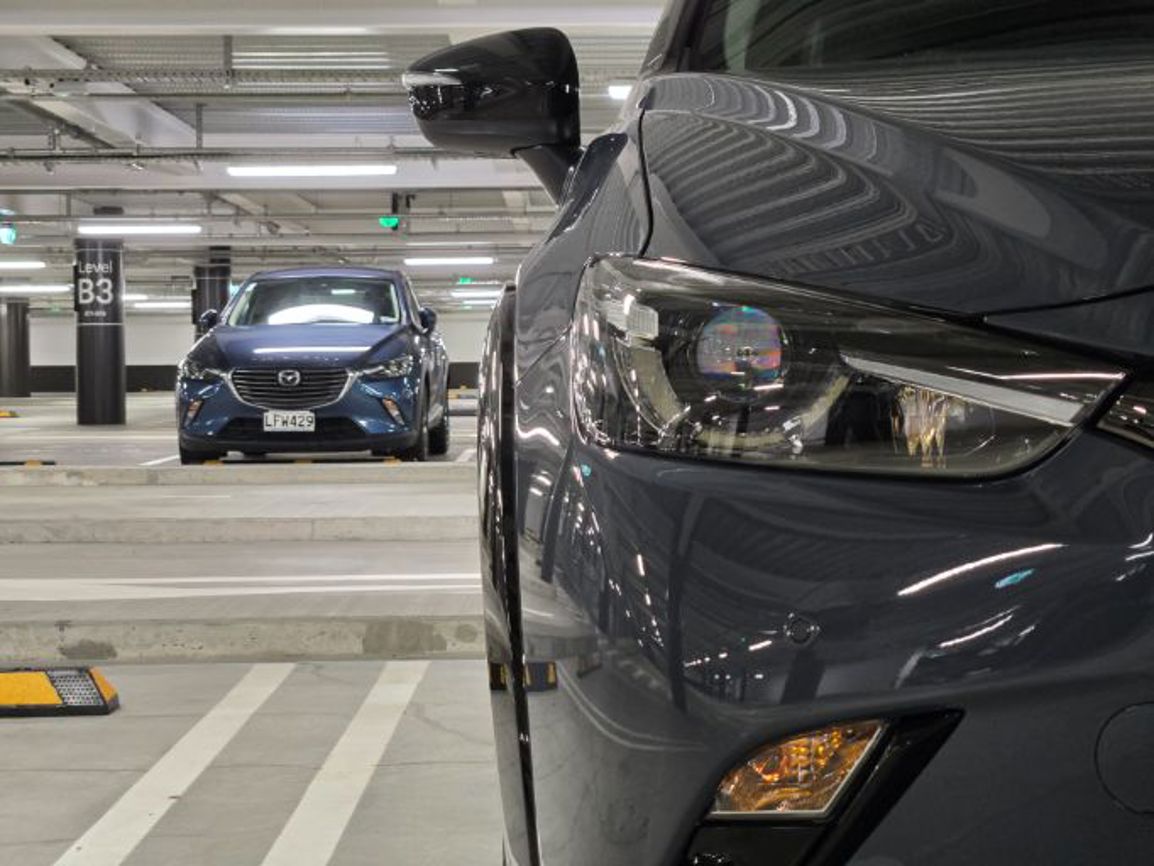
It’s fundamentally the same car that was launched a decade ago, but naturally the CX-3 specification hasn’t been stagnant. Our SP20 is the most recent update, introduced in late-2023 as a new flagship to better align with another Mazda small-SUV, the CX-30, also available in SP-trim. The arrival of CX-3 SP20 also meant goodbye to the Limited.
All CX-3s now have the 2.0-litre 4-cylinder (110kW/195Nm) engine, with a 6-speed automatic and front-drive.
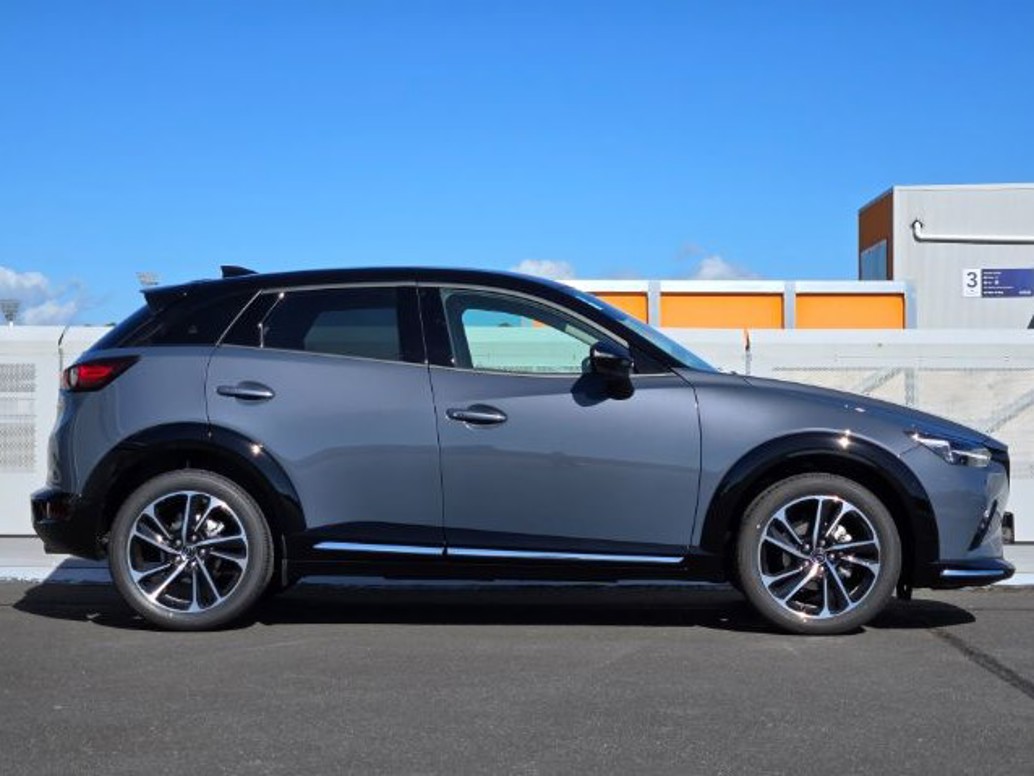
There used to be an AWD option and even a diesel. Diesel engines, remember when small cars had those? The little-D was discontinued in a major model update in 2017 and AWD was rationalised to just one model at the same time, before being phased out in 2021.
We might have a slightly distorted view of just how new driver-assist technology is, but we’re pleasantly surprised how much of it the SP20 has. Some has been added along the way of course, but from the start the CX-3 was available with autonomous braking, blind-spot warning and lane departure.
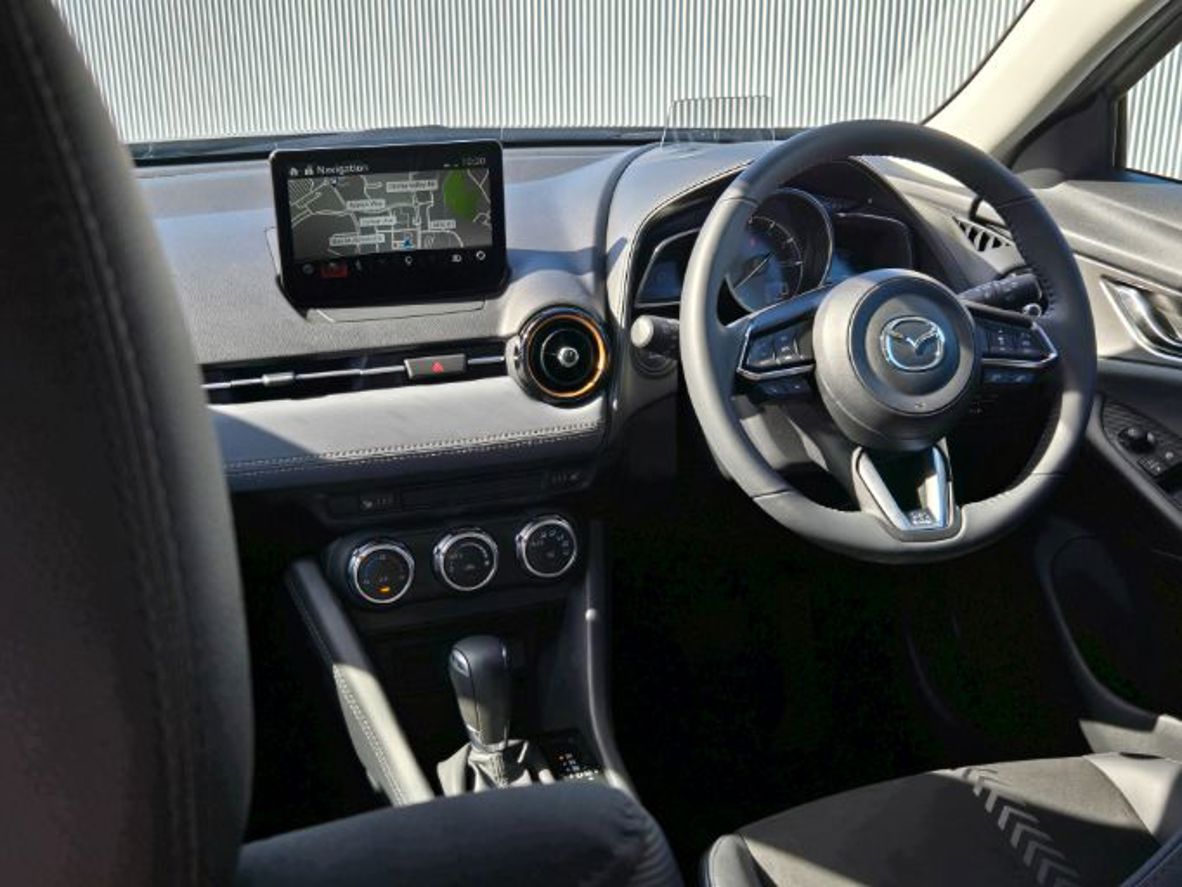
That 2017 update brought G-Vectoring control (a Mazda-proprietary thing that gently reduces engine torque to help with cornering accuracy), traffic sign recognition and radar cruise control. It also now has “smart brake support” (ie autonomous braking) front and rear.
So in terms of what you’d expect to find in a car just released, there’s not a lot missing. The most obvious omission is a camera-based driver distraction alert, which we’re not too cut up about (there is a more passive “driver attention alert” that will suggest you take a break when appropriate). And the lane departure warning really is just a warning, a rather soothing humm that comes through the audio speakers; no steering assistance.
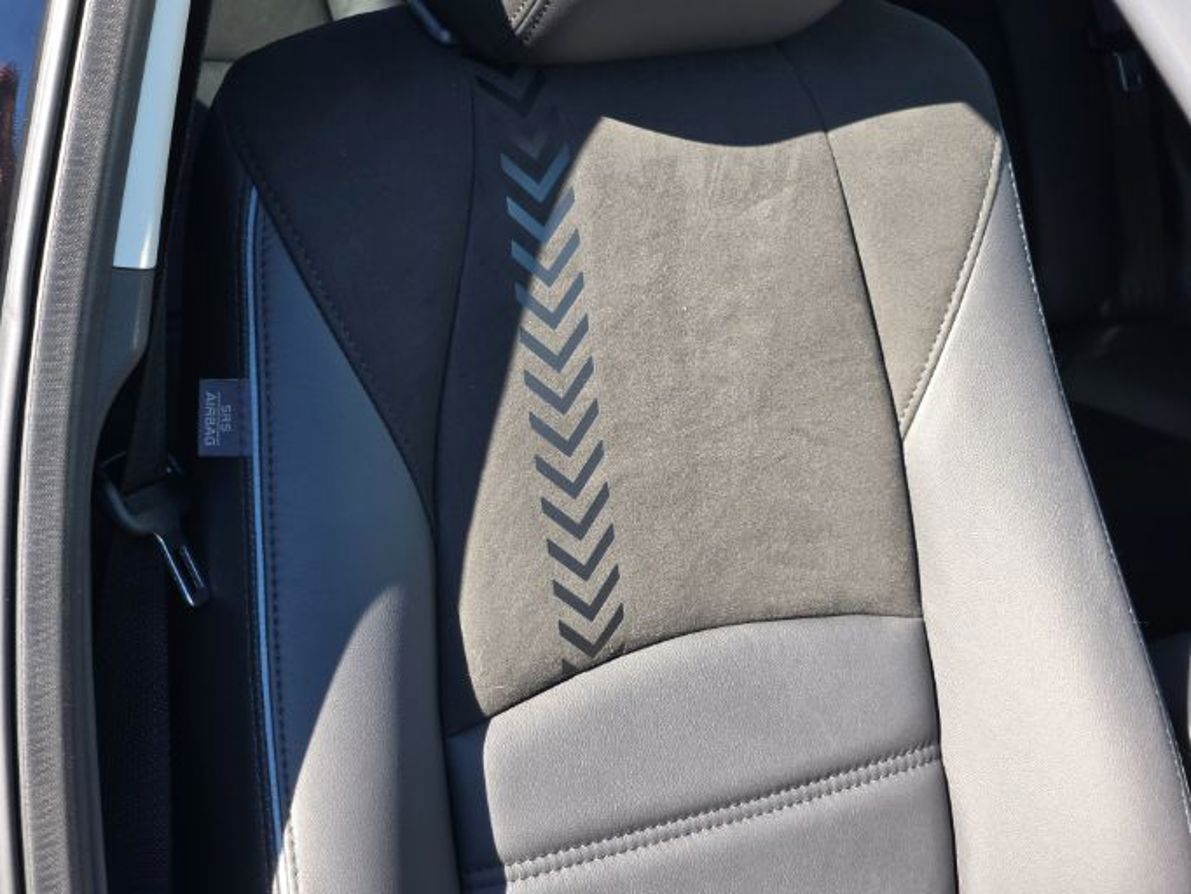
The analogue instrumentation does date the car: the central revcounter (which we quite like, very, um.. Porsche) is flanked by two crude-looking digital displays. But they do the job. And you do get a small heads-up display with much more modern graphics, in full colour; that’s where you’ll find some of the add-on stuff like traffic sign recognition and the distance indicator for the adaptive cruise.
And yes, that is quite a small infotainment display: just 8 inches in diameter, and that’s after a size increase along the model-upgrade journey. It runs on the older MZD Connect operating system, mainly through a BMW iDrive-style rotary controller with pushbutton shortcuts; the screen has touch functionality, but only when the car is stationary… one of Mazda’s more unusual decisions, now superseded in newer models.
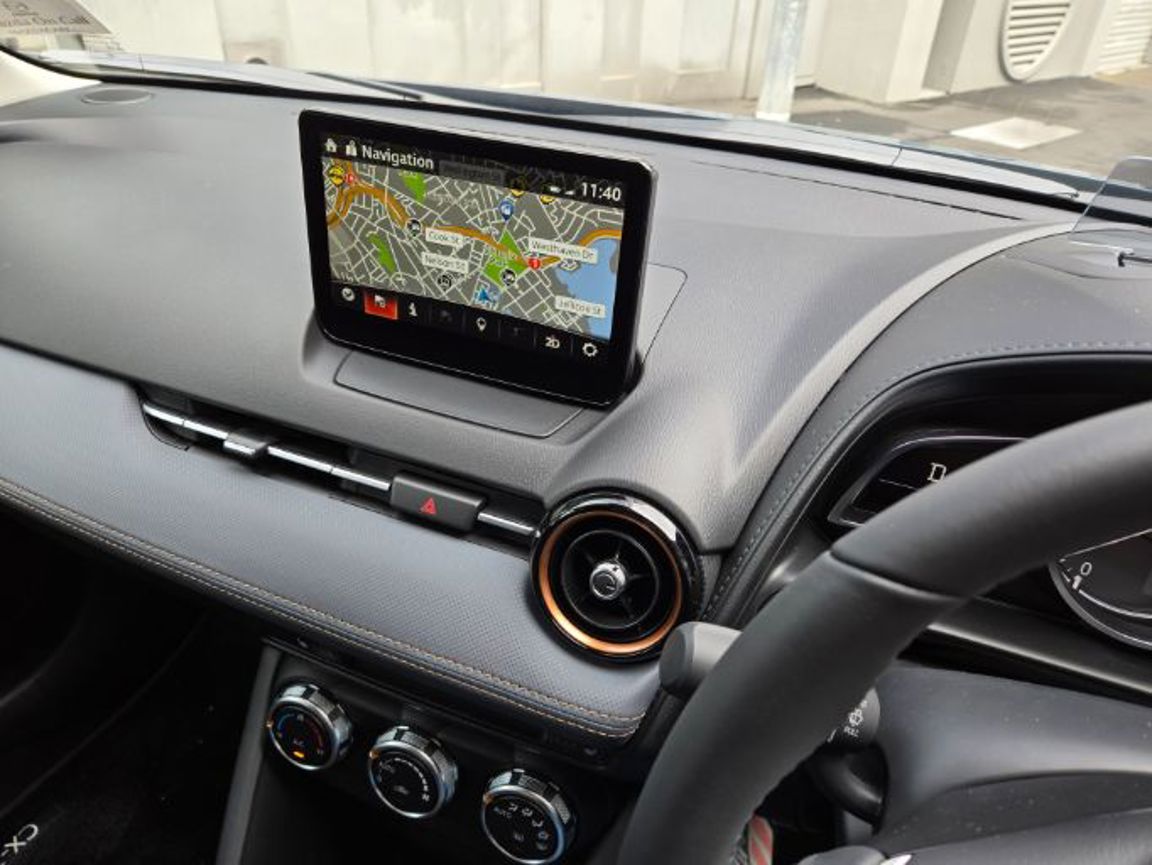
But the CX-3 does have Apple CarPlay and Android Auto phone projection, both added in 2021; wireless for the former, or with a cable for the latter.
We’re spending the next three months with the SP20. Enough time to find out whether the ownership experience has aged as well as the car’s cute looks.
What is the Mazda CX-3?
A compact-SUV loosely based on the Mazda2 hatchback, launched in NZ way back in 2015. It remains a consistent seller for Mazda NZ.
Why are we running it?
To see whether a model that's not the very latest can still be be an engaging urban SUV.

